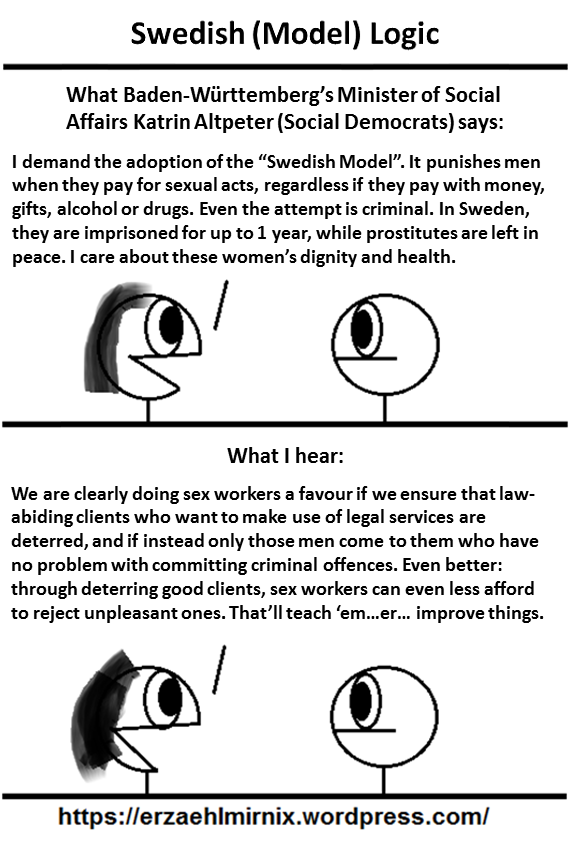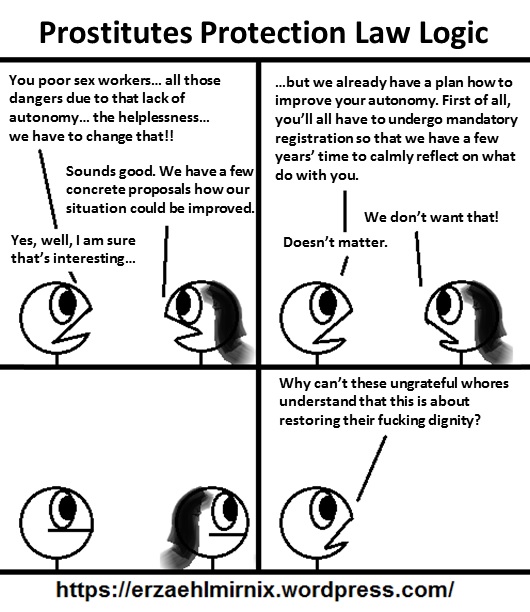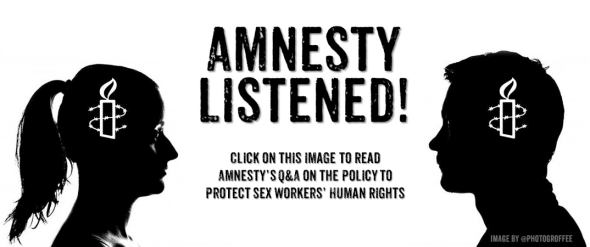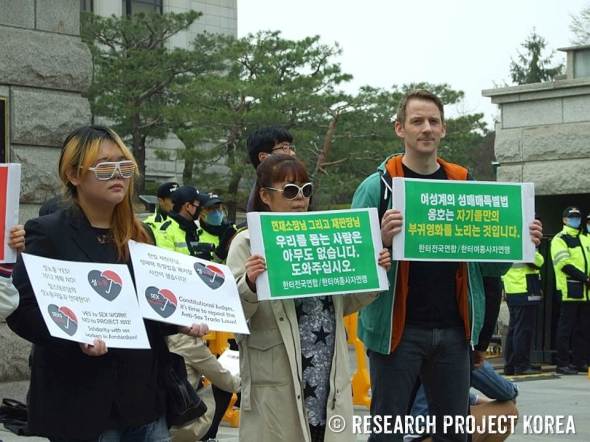Prostitutes Protection Act: Federal Statistical Office Releases 2018 Data

Tweet not included in original text. See note below.
Roughly 32,800 prostitutes registered with authorities at the end of 2018
At the end of 2018, roughly 32,800 prostitutes* were validly registered with the authorities in accordance with the Prostitutes Protection Law (ProstSchG). As the Federal Statistical Office (Destatis) further reports, 1,600 prostitution businesses had been granted permits or provisional permits under the law, which entered into force on July 1, 2017. These results are partly based on administrative structures that are still being set up. This limits the data’s informational value.
Nearly one fifth of all registered prostitutes possess German citizenship
Of the 32,800 registered prostitutes, 25,000 (76%) were 21 to 44 years old. 5,700 (17%) were aged 45 or older, and 2,000 (6%) were between 18 and 20 years old. 6,200 prostitutes (19%) possessed German citizenship. The three most common foreign nationalities of the prostitutes were Romanian with 11,400 (35% of all registered prostitutes), Bulgarian with 3,200 (10%) and Hungarian with 2,400 (7%).
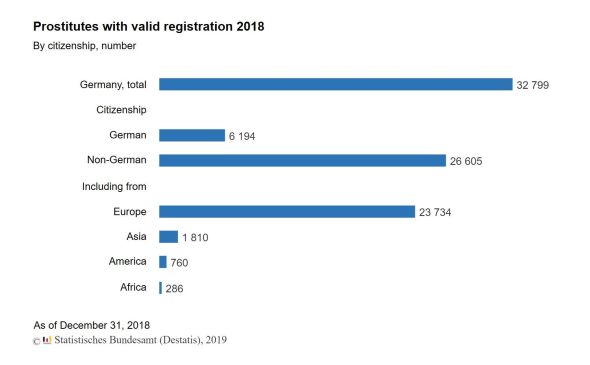
By the end of 2018, 1,600 prostitution businesses were in operation with permits or provisional permits under the ProstSchG. 1,530 (96%) of the registered prostitution businesses were prostitution sites (Prostitutionsstätten, e.g. brothels). Prostitution agencies, vehicles and events accounted for a combined number of 70 permits (4%).
Notes on the data’s informational value – Administrative structures partly still being set up
The data under the ProstSchG is based on information of the relevant authorities and related administrative procedures. Under the law, prostitutes are subject to mandatory registration and prostitution businesses to statutory permission requirements. This statistic was first compiled in 2017. However, in some counties or municipalities, it was not yet possible to register as being engaged in prostitution or obtain a permit for a prostitution business on the reference day of December 31, 2017. Thus, 7,000 prostitutes nationwide had validly registered with the authorities by the end of 2017. The number of prostitution businesses holding a permit was 1,350. The reporting year 2018 marked the first year during which administrative procedures of all federal states were recorded. Nevertheless, at the end of 2018, the statistic is partly based on administrative structures that are still being set up. This limits the data’s informational value. Since the statistic represents administrative procedures pursuant to the ProstSchG, even subsequent data collections cannot include any information about businesses or prostitutes operating without registrations.
Source: Federal Statistical Office (Destatis) “Press Release No. 451 of November 26, 2019”
German version | Abridged English version
Translation by Matthias Lehmann, co-founder of SWAT – Sex Workers + Allies Translate.
“The aim of SWAT is not only to provide sex workers and allies with a network to enable sex work knowledge sharing across as cultural and language barriers, but also to reward contributors for their work whenever possible.”
Please click here for information about SWAT in 18 languages. Please contact SWAT via email if you would like to contribute your skills. You are also invited to join the SWAT Facebook group.
Every effort has been made to translate this press release verbatim. Therefore, the above text uses the term “prostitute” instead of “sex worker.” The tweet by the German AIDS Service Organisation (Deutsche Aidshilfe) did not appear in the original text. It refers to a report from May 2019 [German version] by the Ministry for Regional Identity, Communities and Local Government, Building and Gender Equality of North Rhine-Westphalia, Germany’s most populous state, where less than a quarter of the estimated number of sex workers have registered.
According to the report, “It is to be feared that many prostitutes have retreated into the dark field of prostitution, where they are difficult to reach for authorities and counseling institutions. … There are reasonable doubts as to whether the law, in practice, can ever live up to its original idea of protection.” In its conclusion, the state’s government admit, “There is now a greater risk of slipping into poverty or illegality, losing a job and/or having personal data protection issues. The goal of protecting all sex workers from exploitative structures was not achieved by the introduction of the ProstSchG.”
This translation is licensed under a Creative Commons Attribution-NonCommercial-NoDerivatives 4.0 International License.
Prostitutes Protection Act: Conservatives Fully Achieved Their Objectives

Photo by Abigail Lynn on Unsplash
Haga clic aquí para una traducción al español de este artículo.
ProstSchG well on its way to achieve Conservatives’ goals
A flurry of recent media reports have suggested the Prostitutes Protection Act (herafter ProstSchG) had failed to achieve its stated goals and would not sufficiently protect people engaged in prostitution.
Voice4Sexworkers, a project by and for sex workers, firmly rejects that notion:
The ProstSchG is well on its way to achieve all of the federal government’s desired goals and effects, especially those of the conservative parties [Angela Merkel’s Christian Democratic Union (CDU) and the Christian Social Union (CSU) in Bavaria, together known as die Union]. It may have taken a while, but now, around two years after the ProstSchG went into effect on July 1, 2017, it has become increasingly apparent that the law’s consequences, which we expected and predicted, have materialized up and down the country.
As interior minister Horst Seehofer (CSU) aptly noted on June 6, 2019, when speaking about the legislative process in Germany:
“The law is called the Data Exchange Act. Introduced completely quietly. Quietly, probably because it’s complicated, so it didn’t attract as much attention. Over the last 15 months, I’ve made the experience that you have to make laws complicated, then [laughs] they don’t attract so much attention. We’re not doing anything illegal, we’re doing what’s necessary. But even necessary things are often illegitimately called into question.”
While the subject here was the Data Exchange Act, the same tactic was already employed when the ProstSchG was adopted.
Almost as an aside, the law undermined Germany’s Basic Law [Grundgesetz, GG]. Article 13 GG, which grants the inviolability of one’s home? No longer applies to sex workers. Occupational freedom? That, too, is being undermined through the registration procedures forced upon sex workers. Naturally, the law does not spell that out. That would have been too simple, and then there might have been louder protests against it. (See also: “Prostitutes Protection Law violates fundamental rights”; click here to read the article with Google Translate.)
Instead, the plan was hatched to call the measure “Law on the Regulation of Prostitution and the Protection of Persons Working in Prostitution”, in short, Prostitutes Protection Act. Such things always earn wide acceptance in the society. There is a widespread misconception, however, that the “protection of persons working in prostitution” is meant to do just that: provide sex workers with protection. On the contrary, if one scrutinises the law, one quickly realises that the law aims to protect people from themselves and from prostitution, just like sunscreen does not protect the sun but those using it from the effects of sunlight exposure.
In the context of the ProstSchG, the above-cited quote by Horst Seehofer fits yet again, as the ProstSchG, in a roundabout way, is also supposed to help curb migration. It was clear from the outset that the law would be particularly problematic for people from countries where prostitution is illegal, such as Bulgaria or Romania. If they register as sex workers in Germany, they risk receiving mail in their countries of origin, despite the promised option to have any related mail delivered to a different mailing address. (See for instance, “Prostitutes Protection Act: Between Aspiration and Reality” by the German AIDS Service Organisation; click here to read the article with Google Translate.)
Tax offices flout this provision knowingly and deliberately, and in doing so, they greatly endanger the lives of sex workers in their countries of origin. Protection? Nil. Did lawmakers heed the advice of experts? They did indeed, though not in the way those experts intended. Instead, their expertise and reasoning were turned on their head, making it easy to create regulations that would hit sex workers as hard as possible. Without further ado, the list of measures fundamentally rejected by the called-upon experts was converted into the government’s wish list.
[Irony on] Sex workers require anonymity to protect themselves? Let’s do the opposite and write mandatory registrations into the law. [Irony off]
ProstSchG is intended to deter, not protect
The entire construct of the ProstSchG is intended to deter people from entering prostitution and render sex work impossible in most places. Mandatory registrations at public authorities are nothing short of forced outings in front of strangers. In some places, for instance in the city of Gießen, the government even tasked private organisations with carrying out this measure. (See also: “Sex worker files suit at administrative court against implementation of Prostitutes Protection Act through the city of Gießen”; click here to read the article with Google Translate.)
Such practices reinforce the stigma sex workers are exposed to on a daily basis. Politicians cannot pretend they were unaware that many sex workers would opt to circumvent the mandatory registration procedure and instead, out of necessity, work underground and, thus, illegally. All experts, including representatives of trade associations and counselling centres as well as sex workers themselves, had explicitly warned them this would happen and called for other, better measures, e.g. expanding the offer of counselling centres, funds for job retraining for people in sex work, the full decriminalisation of sex work, the abolition of all measures fuelling the stigma attached to sex work, and many others.
With those measures, however, the federal government would not have achieved their actual goal to quietly abolish prostitution under the guise of helping people in prostitution.
Two years after the adoption of the new law, news articles about the demise of brothels and vacancies in prostitution businesses appear almost on a daily basis, as officially registered sex workers are few and far between. The majority of good and safe work places are fast disappearing, be it due to requirements set out in the ProstSchG or the law’s effects, e.g. sex workers being unable or unwilling to obtain a “Whore ID” in order to avoid being outed. In addition, the ProstSchG dictates that sex workers are no longer permitted to stay overnight at brothels, walk-in brothels (Laufhäuser) and other prostitution businesses. This requires sex workers to earn more money to cover the added daily expenses for a separate bedroom [offered by some prostitution businesses] or hotel room. As a result, many decide to work illegally, either independently or in unlicensed prostitution businesses.
Many sex workers have disappeared from the public sphere for fear of attracting attention and facing an inspection. Consequently, sex workers spent less time on solicitation via internet or phone, which puts them at greater risk as they can no longer screen their clients to the extent necessary.
Sex workers, who were previously able to share apartments where they could both live and work, are now forced to work alone. This results in higher costs (for rent, utilities, advertising, etc., which they were able to share) that most cannot afford on their own. And the protection through their colleagues is, of course, also gone. Where previously sex workers could provide protection to one another, those working in apartments are now forced to work alone. The result: over the last two years, the large majority of those work places has also disappeared.
All this has been confirmed by the recently published “Evaluation of the Prostitutes Protection Act in North Rhine-Westphalia”. (See also: “Ineffective protection of prostitutes: Sex workers pushed underground”; click here to read the article with Google Translate and select “Schon dabei” on the pop-up window.)
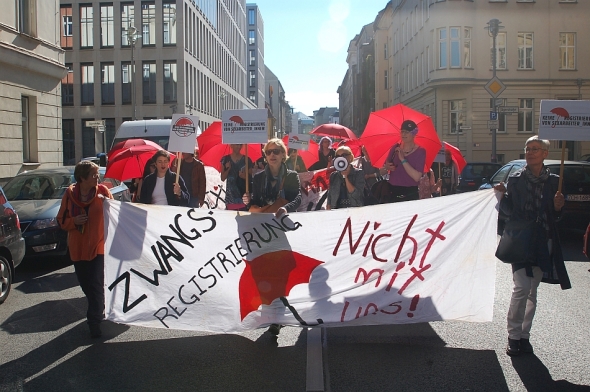
“Forced registration – Not with us!” Sex workers and allies demonstrate against the ProstSchG in front of the Federal Ministry for Family Affairs in Berlin © Emy Fem
Even the counselling centres are hit hard by the ProstSchG, jeopardising years of their work and efforts to build trusting relationships with sex workers. In 2018, Madonna e.V. [a member of the Global Network of Sex Work Projects (NSWP) and the only sex worker self-help project in North Rhine-Westphalia] received significantly less funding from the provincial government. Funding for the widely acclaimed Lola app [offering advice for sex workers in Bulgarian, English, German, Romanian and Turkish] was also reduced. Needless to say, the aforementioned evaluation report conveniently omitted this. (Honi soit qui mal y pense.) Urgently needed counselling positions had to be cut, as funds are no longer sufficient. This is especially worrisome considering that independent and anonymous counselling for people engaging in sex work is immensely important.
In this context, it should be noted here that the Kober counselling centre, which authored the report “Changes and Effects of the ProstSchG on the Prostitution Scene in North Rhine-Westphalia”, which is attached to the aforementioned evaluation report, did receive funds and support from the provincial government. Thus, one can hardly speak of “independent research,” and the report does neither satisfy academic standards nor does it provide answers for the many questions it poses. (Listen to the commentary by cultural scientist Mithu Sanyal; German only.)
Whoever still believes that the Prostitutes Protection Act was intended to protect sex workers also believes that woodchucks chuck wood.
Translation by Matthias Lehmann, co-founder of SWAT – Sex Workers + Allies Translate.
“The aim of SWAT is not only to provide sex workers and allies with a network to enable sex work knowledge sharing across as cultural and language barriers, but also to reward contributors for their work whenever possible.”
Please click here for information about SWAT in 18 languages. Please contact SWAT via email if you would like to contribute your skills. You are also invited to join the SWAT Facebook group.
Every effort has been made to translate this article verbatim. The photo and tweet above as well as some of the links did not appear in the original article. The German original of this article was first published as “Prostituiertenschutzgesetz: Ziele der Union voll erreicht” by Voice4Sexworkers (June 8th, 2019). This translation is licensed under a Creative Commons Attribution-NonCommercial-NoDerivatives 4.0 International License.
Violencia sexual y prostitución: el problema es la imagen que tenéis de nosotras
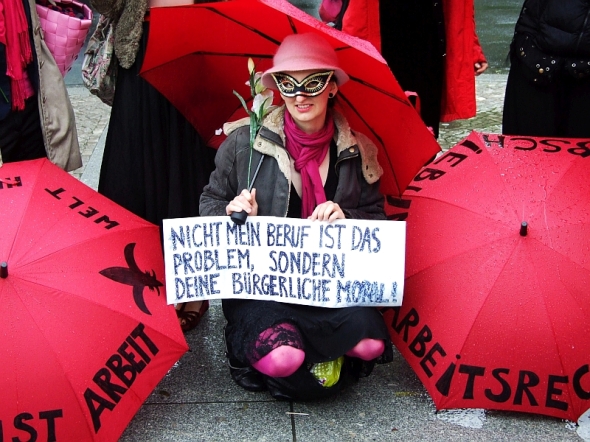
“El problema no es mi ocupación sino vuestra moralidad burguesa.“
© Matt Lemon Photography. Todos los derechos reservados. All Rights Reserved.
Por Marleen Laverte1
El acoso sexual ocurre en la prostitución como ocurre en cualquier otro trabajo. Se necesitan soluciones que no penalicen a todos los clientes.
“¡Si alguien te agarra, quítale la mano inmediatamente y deja claro que no debe tocarte sin pagar!”. Ese fue uno de los primeros consejos que recibí de una compañera trabajadora sexual. Era en 2011, cuando comencé a hacer negocios en Café Pssst !, un bar con habitaciones en la parte trasera. Tanteaba clientes potenciales mientras coqueteaba con ellos; hombres de la clase del que le ponía la mano en el trasero o en el pecho a una mujer, pero que al final no iba a las habitaciones de atrás con ella. Tenían que ir al banco primero para retirar efectivo, decían, y luego simplemente no regresaban, como era de esperar.
En términos generales, nuestros clientes saben muy bien cómo comportarse y nos tratan con respeto; después de todo, son hijos, parejas o padres, no monstruos sin empatía. Sin embargo, al igual que en la gastronomía, el riesgo de encontrarse con un cliente ocasional que te agarre sin tu consentimiento es relativamente alto. O que robe tu tiempo, es decir, tu dinero.
En la mayoría de los burdeles, las prostitutas nos advertimos mutuamente sobre tales clientes transgresores. Intercambiamos información sobre qué observar o qué tipo de clientes es mejor rechazar, si ya te has hartado de su actitud. En algunos de los portales de internet, nos advertimos unas a otras de los clientes que actuaron de forma violenta o inapropiada.
Las redes de trabajadoras sexuales en países de habla inglesa manejan sus propias bases de datos, los llamados “esquemas de Ugly Mugs”, para librar a las compañeras trabajadoras sexuales de tener la misma mala experiencia con un cliente que tuvieron otras, desde transgresiones hasta violencia. Para el área de habla alemana, obtuvimos un “Client-Knigge” [manual de etiqueta] en el que los clientes pueden leer en frío lo que es y lo que no es aceptable.
A pesar de toda la competencia, las putas generalmente nos apoyamos mutuamente cuando se trata de compartir la mejor forma de lidiar con esas raras “ovejas negras”. Proyectos del movimiento por los derechos de las trabajadoras sexuales (como Hydra, Trans*Sexworks o profiS by move e.V.) empoderan a las trabajadoras sexuales para que se levanten contra la violencia y procesen mejor sus experiencias.
Expectativas de rol contradictorias
Aunque es obvio, permítanme aclarar una cosa: ¡un solo cliente transgresivo o violento ya es demasiado! Encuentros con esos clientes son los que ocupan nuestras mentes por un período de tiempo más largo. Para digerirlos, reflexionamos sobre esas experiencias una y otra vez.
Los estereotipos dominantes sobre las prostitutas, que también influyen en nuestro propio pensamiento, dificultan el trazar una línea cuando se trata de transgresiones o conductas violentas: algunos dicen que como “mujeres caídas” no tenemos que culpar a nadie más que a nosotras mismas y debemos considerar esas experiencias como riesgo laboral.
También están aquellos que creen que las prostitutas no pueden ser violadas, ya que aparentemente estamos listas para acostarnos con cualquier persona en cualquier momento. Otros a su vez creen exactamente lo contrario: que cualquier sexo con clientes es violación.
Incluso si no necesitas procesar ninguna grosería, estas expectativas de rol contradictorias pueden desestabilizarte sutilmente sobre qué punto de vista adoptar. Y, sin embargo, no somos “mujeres caídas” ni somos incapaces de expresar o negar el consentimiento, ni todos nuestros clientes son agresores.
La variedad de violencia perpetrada por los clientes es amplia y diversa. En el peor de los casos, incluye asesinatos, y los asesinos en serie — no solo en EE. UU.— la mayoría de las veces eligen prostitutas como sus víctimas, ya que razonablemente pueden esperar que las investigaciones policiales sobre asesinatos de trabajadoras sexuales se lleven a cabo con menos rigor. Además, debido al estigma asociado al trabajo sexual y el miedo a la policía, las trabajadoras sexuales apenas denuncian incidentes. No lo hacen en Alemania, y ciertamente tampoco en países que penalizan a los clientes.
La policía no es inocente
Y, sin embargo, informes recientes de compañeras trabajadoras sexuales de Francia [e Irlanda] han demostrado que desde que se adoptó la penalización de clientes, son especialmente los clientes respetuosos los que se mantienen alejados, mientras que los brutales aceptan fácilmente el pequeño riesgo de ser atrapados. A su vez, la disminución de clientes significa que les guste o no, las trabajadoras sexuales tienen que aceptar clientes significativamente más violentos si quieren evitar caer en la pobreza, ya que las alternativas de trabajo adecuadas son pocas y distantes.
No debería ser una sorpresa que la combinación de diferentes formas de discriminación —tener una identidad trans *, un conocimiento pobre del idioma alemán, ser negra o de color, ser romaní o de otro origen étnico— también aumente el nivel de violencia que experimentan las personas en el trabajo sexual.
Además de la violencia de los clientes, uno no debe ignorar la enorme cantidad de violencia perpetrada por los agentes de policía en todo el mundo. Muy a menudo, los perpetradores se esconden entre las mismas personas de quienes los políticos y los activistas contra la prostitución esperan que nos protejan. En Alemania, los casos de sexo extorsionado (“hazme una mamada y luego te dejaré ir”) quizás no sean tan altos como en otros lugares, pero la policía alemana tampoco es inocente. Compañeras trabajadoras sexuales han informado sobre violencia psicológica, por ejemplo, mediante salidas forzadas del coche durante los controles de licencia de conducir, comentarios sexualizados durante las redadas, ficciones de hacerse pasar por clientes, o preguntas transgresoras y condescendientes cuando se intenta presentar una denuncia.
La exclusión social, especialmente los intentos de librar a las ciudades del trabajo sexual callejero, ha llevado a la adopción de leyes cuyo único propósito es desplazar o encarcelar a las prostitutas. Cuando se prohibe iniciar contacto con clientes potenciales , como sucedió en el barrio St. Georg de Hamburgo; cuando las trabajadoras sexuales regresan a las zonas fuera de límite [Sperrbezirke] para ganar dinero suficiente para pagar las multas que se les imponen y son atrapadas repetidamente hasta que la falta administrativa inicial se convierte en un delito penal; cuando una docena de trabajadoras sexuales van a parar a la cárcel como resultado de todo eso, entonces considero que existe una privación de la libertad de las prostitutas por parte de las autoridades legislativas y ejecutivas.
Indiscriminadamente encasilladas como víctimas
Nuestras fronteras merecen el mismo respeto que las de los demás. Llegar a darse cuenta de algo tan obvio puede ser difícil a veces en una sociedad que nos segrega y nos encasilla de forma indiscriminada como víctimas.
A las trabajadoras sexuales se nos está robando la oportunidad de dirigir un debate público diferenciado sobre la violencia en la prostitución. ¿Cómo tratar el hecho de que eliges esta ocupación después de una cuidadosa consideración, sabiendo mucho acerca de los posibles peligros? ¿A quién tomas como un modelo a seguir? ¿Cómo lidias con la violencia, sin infravalorarla y sin generalizarla?
Se necesitan soluciones que no penalicen a todos los clientes. Existe una falta de comprensión de que, ante todo, son los prejuicios sociales sobre la prostitución los que nos dificultan protegernos a nosotras mismas. Eso es porque esos prejuicios bajan el umbral para usar la violencia contra nosotras: entre los clientes, entre la policía, entre todos. Desearía que se escuchara a las trabajadoras sexuales y que se nos consultara acerca de qué medidas consideramos útiles para prevenir la violencia y cuáles no recomendamos.
Incluso si ello puede ser incómodo para muchas personas: las campañas públicamente visibles que representan a nuestros clientes y a nosotras mismas como personas respetables serían más efectivas que los registros forzosos.2 Porque el problema no somos nosotras, sino los prejuicios que tenéis contra nosotras.
1 La autora es trabajadora sexual y escribió aquí bajo su seudónimo.
2 La “Ley de Protección de Prostitutas”, que entró en vigencia en Alemania el 1 de julio de 2017, introdujo el registro obligatorio de trabajadoras sexuales, así como sesiones obligatorias de consejería en salud y la posibilidad de emitir órdenes administrativas contra ellas. Para más información, remítase al Informe del Comité Internacional sobre los Derechos del Trabajador Sexual en Europa (ICRSE), titulado “Protección profesada, disposiciones sin sentido – Descripción general de la Ley alemana de protección de las prostitutas (Prostituiertenschutzgesetz – ProstSchG)”. Los lectores interesados también pueden referirse al Informe Comunitario de ICRSE “Explotación: disposiciones laborales injustas y condiciones de trabajo precarias en la industria del sexo”.
Muchas gracias a Citerea Anadiomena para la traducción en español. Publicado con el permiso de usar. Visita el blog El Estante De La Citi para obtener más textos en español. Traducción original del alemán al inglés por Matthias Lehmann, cofundador de SWAT – Trabajadores sexuales y sus amigos traducen, editar, y diseño.
“El objetivo de SWAT no es solo proporcionar a las trabajadoras sexuales y aliados una red para permitir el intercambio de conocimientos sobre trabajo sexual a través de barreras culturales y de idioma, sino también recompensar a los contribuyentes por su trabajo siempre que sea posible.”
Haga clic aquí para obtener información sobre SWAT en 18 idiomas. Póngase en contacto con SWAT por correo electrónico si desea contribuir con sus habilidades. También le invitamos a unirte al grupo SWAT de Facebook.
El traductor desea agradecer a Marleen Laverte por sus comentarios sobre el primer borrador de esta traducción. Se han hecho todos los esfuerzos para traducir este artículo palabra por palabra. La foto y el video de arriba, así como la segunda nota al pie no aparecieron en el artículo original.
El original en alemán de este artículo se publicó por primera vez como “Sexuelle Gewalt und Prostitution: Das Problem ist euer Bild von uns” por die tageszeitung (20 de noviembre de 2017). Tenga en cuenta que el copyright de este artículo corresponde a Die Tageszeitung y no está licenciado bajo una licencia de Creative Commons.
The translator would like to thank Marleen Laverte for her comments on the first draft of this translation. Every effort has been made to translate this article verbatim. The photo and video above as well as the second footnote did not appear in the original article.
The German original of this article was first published as “Sexuelle Gewalt und Prostitution: Das Problem ist euer Bild von uns” at die tageszeitung (November 20th, 2017). Please note that the copyright for this article lies with die tageszeitung and is not licensed under a Creative Commons (Comunes Creativos) License.
https://twitter.com/CitereaAnadiome/status/965365980171063296
Vorgeblicher Schutz, Vergebliche Maßnahmen: Überblick über Deutschland’s neues Prostituiertenschutzgesetz (ProstSchg)

Sexarbeiter*innen und Unterstützer*innen demonstrieren gegen das ProstSchG vor dem Bundesfamilienministerium © 2015 Emy Fem
ICRSE präsentiert Briefing Paper über
neues deutsches ‘Prostituiertenschutzgesetz’
[English-language version here]
Anlässlich des Internationalen Hurentags, der an jedem 2. Juni der Besetzung der Saint-Nizier-Kirche im franzöischen Lyon im Jahr 1975 durch 100 Sexarbeiterinnen feierlich gedenkt, präsentiert das Internationale Komitee für die Rechte von Sexarbeiter*innen in Europa (ICRSE) ein Briefing Paper mit dem Titel „Vorgeblicher Schutz, Vergebliche Maßnahmen: Überblick über das Prostituiertenschutzgesetz (ProstSchg)“.
![ICRSE ProstSchG Briefing Paper Cover [German]](https://researchprojectgermany.wordpress.com/wp-content/uploads/2017/06/icrse-prostschg-briefing-paper-cover-german.jpg?w=198&h=278) Das Briefing Paper wurde vom ICRSE in Zusammenarbeit mit Hydra e.V. und dem Berufsverband erotische und sexuelle Dienstleistungen (BesD) e.V. mit dem Ziel entwickelt, sowohl politischen Entscheidungsträger*innen als auch Sexarbeiter*innen und ihren Unterstützer*innen eine Analyse des neuen deutschen „Prostituiertenschutzgesetzes“ und dessen erwarteten Auswirkungen auf Sexarbeiter*innen anzubieten, sowie Empfehlungen der Gemeinschaft von Sexarbeiter*innen zu unterbreiten.
Das Briefing Paper wurde vom ICRSE in Zusammenarbeit mit Hydra e.V. und dem Berufsverband erotische und sexuelle Dienstleistungen (BesD) e.V. mit dem Ziel entwickelt, sowohl politischen Entscheidungsträger*innen als auch Sexarbeiter*innen und ihren Unterstützer*innen eine Analyse des neuen deutschen „Prostituiertenschutzgesetzes“ und dessen erwarteten Auswirkungen auf Sexarbeiter*innen anzubieten, sowie Empfehlungen der Gemeinschaft von Sexarbeiter*innen zu unterbreiten.
Wie darin erklärt, hegt das ICRSE ernsthafte Bedenken hinsichtlich der Art und Weise, mit der das „Prostituiertenschutzgesetz“ die Grundrechte von Sexarbeiter*innen untergräbt. So beschränken die Anmeldepflicht und die Möglichkeiten, Anordnungen gegenüber Sexarbeiter*innen zu erlassen, das Recht auf freie Berufswahl, und die weitreichenden Überwachungsmöglichkeiten, die das ProstSchG den Behörden gegenüber Sexarbeiter*innen einräumt, verletzen das Grundrecht auf Unverletzlichkeit der Wohnung. Besonders schwer wiegt die Speicherung persönlicher Daten in Verbindung mit Informationen zum Sexualleben einer Person, denn sie verletzt das Grundrecht auf informationelle Selbstbestimmung und die Richtlinie des Europäischen Parlaments zum „Schutz natürlicher Personen bei der Verarbeitung personenbezogener Daten“. In Anbetracht der Tatsache, dass ein absolut sicherer Datenschutz unmöglich gewährleistet werden kann, ist die zukünftige Datenerhebung damit höchst problematisch.
Fazit
Das „Prostituiertenschutzgesetz“ ist in der Form, in der es am 1. Juli 2017 in Kraft treten wird, nur vorgeblich ein Gesetz zum Schutz von Sexarbeiter*innen und die darin enthaltenen Maßnahmen sind vergeblich, um Sexarbeiter*innen auf der einen Seite und Betroffene von Menschenhandel auf der anderen nachhaltig zu unterstützen. Stattdessen werden insbesondere in Wohnungen gemeinsam arbeitende Sexarbeiter*innen sowie migrantische, transidente, und anderweitig spezifisch vulnerable Sexarbeiter*innen von diesem Gesetz in die Illegalität gedrängt. Wo Schutz draufsteht, ist daher in großen Teilen schlicht ein Gesetz zur Verdrängung der Sexarbeit enthalten.
Wir laden Sexarbeiter*innen und politische Entscheidungsträger*innen dazu ein, das Briefing Paper aufmerksam zu lesen und die Empfehlungen der Gemeinschaft von Sexarbeiter*innen zu beachten.
Download
Bitte hier klicken, um die deutsche Version herunterzuladen.
Bitte hier klicken, um die englische Version herunterzuladen.
Impressum
Autorinnen: Angela Herter and Emy Fem
Co-Autor und Lektor: Matthias Lehmann (Research Project Germany)
Übersetzung: Ursula Probst
Design: Aleksandra Haduch
Fotos: Matthias Lehmann und Emy Fem
![ICRSE ProstSchG Briefing Paper Quotes [German]](https://researchprojectgermany.wordpress.com/wp-content/uploads/2017/06/icrse-prostschg-briefing-paper-quotes-german.jpg?w=590)
Dieser Artikel wurde zuerst am 31. Mai 2017 in englischer Sprache unter dem Titel “Sex Workers’ Rights Day: ICRSE launches Briefing Paper on Germany’s new ‘Prostitutes Protection Act’” auf der Website des Internationalen Komitees für die Rechte von Sexarbeiter*innen in Europa (ICRSE) veröffentlicht. Reproduziert mit freundlicher Genehmigung.
Professed Protection, Pointless Provisions – Germany’s new “Prostitutes Protection Act” (ProstSchG)

“Forced registration – Not with us!” Sex workers and allies demonstrate against the ProstSchG in front of the Federal Ministry for Family Affairs in Berlin © 2015 Emy Fem
ICRSE launches Briefing Paper on
Germany’s new ‘Prostitutes Protection Act’
[Deutsche Version hier]
To mark the International Sex Workers’ Day, celebrated each year on June 2nd to commemorate the occupation of the Saint-Nizier Church in Lyon, France, by 100 sex workers in 1975, ICRSE launches a briefing paper titled “Professed Protection, Pointless Provisions – Overview of the German Prostitutes Protection Act (Prostituiertenschutzgesetz – ProstSchG)”.
![ICRSE ProstSchG Briefing Paper Cover [English]](https://researchprojectgermany.wordpress.com/wp-content/uploads/2017/06/icrse-prostschg-briefing-paper-cover-english.jpg?w=197&h=277) The briefing paper was developed by ICRSE in collaboration with Hydra e.V. and the Professional Association Erotic and Sexual Services (Berufsverband erotische und sexuelle Dienstleistungen, BesD e.V.). It aims to offer policy makers, sex workers, and sex workers’ allies an analysis of Germany’s new “Prostitutes Protection Act” and its expected impact on sex workers, and outline recommendations from the sex worker community.
The briefing paper was developed by ICRSE in collaboration with Hydra e.V. and the Professional Association Erotic and Sexual Services (Berufsverband erotische und sexuelle Dienstleistungen, BesD e.V.). It aims to offer policy makers, sex workers, and sex workers’ allies an analysis of Germany’s new “Prostitutes Protection Act” and its expected impact on sex workers, and outline recommendations from the sex worker community.
As noted therein, ICRSE has serious concerns about the ways the “Prostitutes Protection Act” will significantly undermine many of sex workers’ fundamental rights. The mandatory registration of sex workers and the possibility of issuing administrative orders against them limit their right to freedom of vocational choice, and the extensive means of surveillance that the “Prostitutes Protection Act” affords the authorities infringes the constitutional right of the inviolability of the home. The recording of personal data in connection with information about persons’ sexual life is a particularly serious issue as it violates the fundamental right to informational self-determination and the directive of the European Parliament on “the protection of individuals with regard to the processing of personal data”. Given the impossibility of providing absolute data protection, the upcoming collection of this personal information is highly problematic.
Conclusion
The “Prostitutes Protection Act”, in the form that it will come into effect on July 1, 2017, only pretends to be a law for the protection of sex workers. The regulations provided therein fail to support both sex workers and trafficked persons. Instead, the law will force sex workers into illegality, especially those working together at apartments as well as migrant, trans, and otherwise particularly vulnerable individuals in sex work. What is labelled as protection is in large parts simply a law aimed at repressing sex work.
We invite sex workers and policy makers to read the briefing paper and take note of the recommendations from the sex workers’ community.
Download
Click here for the English version.
Click here for the German version.
Credits
Authors: Angela Herter and Emy Fem
Contributing Author and Copy Editor: Matthias Lehmann (Research Project Germany)
Translation: Ursula Probst
Design: Aleksandra Haduch
Photos: Matthias Lehmann and Emy Fem
![ICRSE ProstSchG Briefing Paper Quotes [English]](https://researchprojectgermany.wordpress.com/wp-content/uploads/2017/06/icrse-prostschg-briefing-paper-quotes-english.jpg?w=590)
This article was first published as “Sex Workers’ Rights Day: ICRSE launches Briefing Paper on Germany’s new ‘Prostitutes Protection Act’” on the website of the International Committee on the Rights of Sex Workers in Europe (ICRSE) on May 31st, 2017. Republished with kind permission.
Nueva Ley de Prostitución en Alemania: una ley especial impracticable y discriminatoria | Declaración de Voice4Sexworkers (Voz para trabajadores sexuales)

Foto: Parodia del registro de prostitutas en una protesta de trabajadoras sexuales en Berlín © 2016 Friederike Strack. Todos los derechos reservados.
En el día de hoy, la ministra de Salud de Rhin Norte-Westfalia, Barbara Steffens, y la presidenta de la Mesa Redonda sobre la Prostitución de Rhin Norte-Westfalia, Claudia Zimmermann-Schwartz, dieron una conferencia de prensa acerca de la planeada Ley de Protección de Prostitutas, de la que dijeron que llevará aún más a las trabajadoras sexuales a la ilegalidad, en lugar de protegerlas. Como parte del comunicado de prensa, se presentaron las declaraciones de dos trabajadoras sexuales que participaron en la Mesa Redonda. Lo que sigue es la declaración ampliada de una de ellas, traducida del original en alemán publicado por Voice4Sexworkers. Hacer clic, por favor, aquí para ver el comunicado de prensa emitido por el Ministerio de Salud, Igualdad, Servicios Sociales y Personas Mayores en Rhin Norte-Westfalia. Este recurso está en alemán.
Declaración de Melanie, participante en la Mesa Redonda sobre Prostitución
Soy madre soltera de dos hijos y he estado trabajando como trabajadora sexual durante los pasados diez años. Nunca he conseguido ganarme totalmente la vida con el trabajo sexual, pero no quise volver a recibir ayuda social o vivienda protegida. Por esta razón, los ingresos adicionales provenientes del trabajo sexual han sido siempre bien recibidos y me han permitido proporcionar a mis niños vidas normales libres de exclusiòn social.
El principio más importante —y esto es exactamente en lo que no se basa el proyecto de ley sobre nosotras— es que la prostitución tiene que ser despenalizada antes de ponerse a regularla. Esto significa que el trabajo sexual no debe ser regido por el código penal. El año pasado, Amnistía Internacional llegó a la misma conclusión tras llevar a cabo durante dos años un amplio estudio en el que entrevistaron a trabajadoras sexuales, en particular en los países en los que el trabajo sexual está intensamente regulado o incluso prohibido. Un informe de la ONU de 2012, basado en la investigación llevada a cabo en 48 países, encontró también que los sistemas de licencias o registros demostraban ser ineficaces o beneficiaban solo a un pequeño número de trabajadoras sexuales. En las jurisdicciones que han introducido estos sistemas, la vasta mayoría de las trabajadoras sexuales operaba fuera de ellos. Comparaciones con países como Alemania revelaron que las situaciones de trabajo y de vida de las trabajadoras sexuales mejoran cuando el trabajo sexual es legalizado. Pero los resultados más positivos se han conseguido en Nueva Zelanda, donde el paso final hacia la despenalización se dio hace casi 13 años. (more…)
ProstSchG: An impractical and discriminatory special law | Statement by Voice4Sexworkers

Photo: Mock Whore ID at sex worker protest in Berlin © 2016 Friederike Strack. All Rights Reserved.
Today, North-Rhine Westphalian Health Minister Barbara Steffens and Claudia Zimmermann-Schwartz, Chairwoman of the Roundtable Prostitution in North Rhine-Westphalia (NRW), held a press conference about the planned Prostitutes Protection Law (ProstSchG), which they argued would further drive sex workers into illegality instead of protecting them. As part of the press release, statements from two sex workers who participated in the Roundtable were presented.The following is an expanded statement from one of them, translated from the German original published by Voice4Sexworkers. Please click here to view the press release by the Ministry of Health, Equalities, Care and Ageing (MGEPA) in NRW. This resource is in German.
Statement by Melanie, Participant at Roundtable Prostitution
I’m a single mother of two and I’ve been working as a sex worker for the past ten years. I’ve never been able to earn my entire livelihood through sex work but I didn’t want to fall back on receiving welfare or housing benefits. That’s why the additional income from sex work has always been welcome and has enabled me to afford my children normal lives free from social exclusion.
The most important principle – and that’s exactly what the draft bill before us is not based on – is that prostitution has to be decriminalised first before one sets out to regulate it. This means that sex work must not be governed by criminal law. Last year, Amnesty International arrived at the same conclusion after conducting a comprehensive 2-year study in which they interviewed sex workers, particularly in countries were sex work is heavily regulated or even forbidden. A UN report from 2012, based on research in 48 countries, also found that licensing or registration systems proved to be ineffective or benefited only a small number of sex workers. In jurisdictions that have introduced these systems, the vast majority of sex workers operated outside of them. Comparisons with countries like Germany revealed that the working and living situations of sex workers improve when sex work is legalised. But the most positive results have been accomplished in New Zealand, where the final step towards decriminalisation was taken almost 13 years ago.
The authors of this Prostitutes Protection Law did not muster that same courage. Under the guise of wanting to protect us, they drafted a bill that is entirely “exit-oriented” but mentions nothing about how to earn a living or receive benefits for one’s livelihood. The Hartz IV welfare benefits are insufficient even now, and it is for that very reason that many of us choose to engage in sex work. If one were really interested in helping us, other alternatives and practical assistance were required instead of fobbing us off with minimal basic coverage. Notably, in urban areas where the unemployment rate is high, this minimal basic coverage does not provide for sustainable future prospects.
Instead of the current plan of sinking an initial 76.2 million euros followed by 85 million euros annually into this bureaucratic monster, these funds could be used for more meaningful projects, such as counselling centres, self-help organisations, interim payments, and support for qualification measures to enable occupational reorientation. A social welfare fund for sex workers would also be a blessing, since a considerable percentage of us cannot even afford the minimum contribution towards our health insurance.
Instead of offering us the assistance we have suggested time and time again, the new law would impose insurmountable obstacles on us. Our survey among sex workers from December 2015 has also shown what they really wish for and need: effective protection from discrimination, protection against dismissal from a primary job due to engaging in sex work on the side, protection against extortionate rent, more counselling centres (particularly of the kind that don’t just offer help on how to exit, but also how to safely enter sex work), and better protection of their anonymity, especially when dealing with authorities. The ProstSchG fails to provide any of that and instead amounts to the exact opposite, since it even goes as far as to cancel out the Basic Law. If this new law came into effect, the police would be allowed to enter any private home without a court order. A simple allegation that prostitution was taking place in any given apartment would suffice as justification.
Registration
In our survey, around one third of all respondents stated they had already had negative experiences with authorities. An equally large share stated they had never outed themselves to authorities out of fear or shame. Together, they represent far more than half of all respondents. Having to explain oneself and provide intimate details to a stranger would only exacerbate this trend.
In addition, it is incomprehensible why it should be necessary to provide all our work locations or have to register anew to work in additional cities or states. These measures are simply meant to enable authorities to create movement profiles that would reveal a lot but contribute nothing to our protection.
Licensing
Instead of supporting people engaged in sex work to self-organise and create individual work places, the employment situation of independent sexual service providers would be made worse. It’s not enough that the law in its current form would effectively give big operators supervisory powers over sex workers, since operators would have to record their registration details, length of stay and other specifics to pass on to authorities. The law would also strengthen the overall position of those operators by rendering it virtually impossible for sex workers to work alone or with colleagues in apartments. As a result, it would push them into the hands of the very operators who are such thorns in the sides of so many municipal politicians – just their sight, of course, not their taxes. This law pretends to protect us from heteronomy but it would cause the exact opposite: it would deprive most of us of the opportunity to self-determined and independent work.
The authors also further the “laissez fairy tale” of prostitution businesses not being subject to strict regulations and the poor police having no way of controlling anything. Nothing could be further from reality. Rather, it is an attempt to win approval for the draft bill from the public instead of explaining to them why an annual 85 million euros should be forked out for measures that will not help sex workers or those municipalities already short on funds.
Stigma
The draft bill consistently lacks the principle of impartiality. It is blatantly apparent that the authors were unable to discard the stigma attached to sex work, against which (incidentally), no steps have ever been taken since the current prostitution law came into force.
Instead, the measures planned under the Prostitutes Protection Law aggravate and intensify the very stigma which sex workers around the world cite consistently as the the main obstacle in their daily lives. The wording of the draft bill and the claims made in the substantiation for the law exacerbate the pre-existing prejudices and clichés. If sex work is mentioned in the same breath as criminal activities and sexual exploitation, that is the image that manifests in people’s heads.
Those who dismiss the few sex workers who dare to stand up for their rights as “privileged” should rather become aware of their own complicity in the stigmatisation of sex work. Instead of drafting laws that will curtail the options of all sex workers, the focus should be to add to options available to them. Those who would be affected the most by this law are the very people who already have too few options to begin with, namely migrants and trans* people, and who are often subject to multiple discriminations on a daily basis.
Conclusion
My participation in the “Roundtable on Prostitution in North Rhine-Westphalia” was the first time I experienced people talking with me. Usually, people only talk about me, even when I’m present. The Roundtable proved that it is entirely possible to sit down with the actual experts – us (!) – and find solutions. If one doesn’t talk with sex workers one ends up with the very result the ProstSchG represents: an impractical and discriminatory special law, which excludes us from equal participation in economic life and renders us socially vulnerable.
Original by Voice4Sexworkers. Translation by Matthias Lehmann. Proofreading by Christy Swain and Gabriel Pettyjohn. Published with kind permission.
Prostitution: Trade Supervision instead of Repression

The plans for the “Prostitutes Protection Law” have reached a cul-de-sac, explains Criminal Law Professor Dr. Monika Frommel. Rather than patronising sex workers with criminal and police laws, they should be protected from exploitative brothel operators by using the trade law.
By Prof. emer. Dr. Monika Frommel
Please note that the copyright for this article lies with Dr. Monika Frommel and is not licensed under a Creative Commons License.
Why do politicians fail yet again [1] to adequately regulate prostitution during this legislative period? The goal of a reform should be to control brothel operators as effectively as possible. But instead, a draft bill has been created that will achieve the opposite: the strict and bureaucratic monitoring of sex workers. Brothel operators, on the other hand, have little to be afraid of.
Instead of “protection” from exploitation, the draft bill, modified several times and unlikely to draw a consensus, includes the duty to register and undergo health checks for those individually engaging in this line of work (it was once called “Bockschein”). [A1] Health authorities are supposed to be responsible for those health checks but they can neither provide comprehensive advice nor offer affordable HIV prevention. If one dictates mandatory health checks carrying potential sanctions anyway, one creates an entirely useless Normenfalle [lit. trap of norms; numerous regulations that are impossible to abide by at all times, which in turn renders them permanently criticisable and sanctionable; translator’s note]. The new provisions concerning police powers are unreasonable anyway. What’s missing is the tailwind for an adequate reform. Headwind there is plenty, however, for example from the fringes of the women’s movement, once interested in emancipation [but now arguing that] buying sex should be banned, clients of “forced prostitutes” should be punished, 90 percent of prostitutes were victims of human trafficking, and prostitution constituted an attack on “women’s dignity” – hard to believe that women who regard themselves as emancipated engage in such proxy battles. [A2] So far, they haven’t gotten their way, but they’ve nevertheless caused damage.
“Economically weak independent entrepreneurs exist not only in this line of work”
It’s simply absurd to prosecute exploitation – as hitherto – via the bizarre detour of making claims about human trafficking, a criminal offence whose legal definition has up until recently been regularly expanded at the instigation of the EU. Everybody involved has known for years that this leads nowhere and cannot lead anywhere. So why then repeat in the future what had not been thought through in the past already but was only ideologically motivated? The ideology is known: human trafficking is always forced labour, prostitution is almost always forced prostitution (apart from a few exotics). How do politicians for women’s affairs get to this simple equation? Many people work under economic constraints. (Apart from extreme exceptions) Brothel operators and third parties force nobody into prostitution. Economically weak independent entrepreneurs exist not only in this line of work. From that perspective, providing sexual services is a job like any other. A “Prostitutes Protection Law” could make sense. What doesn’t make sense is to speak about “coercion” and “voluntariness” exclusively in the context of prostitution but not in other lines of work, where poorly qualified workers are also being exploited. Not the work itself is harmful but the unchecked economical necessity to serve too many clients in order to be able to afford too high rental fees and extra costs. What is now planned complicates the work of those engaged in sex work without providing any benefits for them.
If legislators were interested in a rational, long-term solution and not in phoney, moralising debates, what would be the goal of an effective regulation under the trade law? Technically, brothels would be classified as commercial enterprises requiring permissions from licensing authorities. This would depend on the constantly verifiable compliance with minimum requirements. Experienced authorities could respond flexibly whenever operators would fall short of the specified minimum standards. Those who work there (independently) could examine the files at the trade office and check if the fees deducted for operational costs are in fact realistic, just as tenants have the right to control such matters and have tenants associations who support them in that. Why shouldn’t that be possible at brothels?
“The planned Prostitutes Protection Law relies too heavily on the police”
Only if the trade supervisory board cooperated with those working there would there be a chance to recognise if and where exploitation occurs – which is actually liable to prosecution in accordance with §180a StGB [German Criminal Code; tn] (Exploitation of Prostitutes); but if the responsible trade supervisory board isn’t furnished with the relevant powers, it cannot be proven. Instead of the currently empty threat of criminal proceedings, several more flexible legal instruments could be used. If operators would not fulfil their requirements, one could bar them and their representatives (or straw men) from any further activity in this industry.
Therefore, trade supervision would be the solution, but faced with diffuse resistance [2], the Ministry of Women’s Affairs could not prevail, and it hadn’t planned anyway to discuss the subject earnestly. Viewed in this light, nobody’s surprised that the Prostitutes Protection Law, planned in 2014, continues to rely all too heavily on the police and for that reason has ended in a cul-de-sac. Under the terms of this law, sex workers would have to register with authorities, otherwise they would commit an administrative offence. They would also have to regularly repeat this procedure, and every time they would work at a new location, which is frequently the case, they would have to register anew. In addition, they would always have to carry with them a certificate documenting their timely attendance of mandatory health checks (at the health authorities). What kind of protection is that supposed to achieve?
About Dr. Monika Frommel

Dr. Monika Frommel is an emeritus criminal law professor. She studied Law at the University of Tübingen and at the Ludwig Maximilians University Munich, where she obtained her doctorate in 1979 and received her habilitation in 1986. Until 2011, she was the director of the Institute of Sanction Law and Criminology at University of Kiel. Since 1990, she is a co-editor of the legal journal Neue Kriminalpolitik. Her current research interests include criminology from a feminist perspective, in particular the reform of sexual criminal law, and ethics in reproductive medicine.
Photo: Usage Worldwide
Footnotes
[1] In 2014, there still seemed to be hope. See Monika Frommel „Gelingt es in dieser Legislaturperiode, die Prostitution angemessen zu regulieren?“ in: Kritische Justiz 1/2015, pp. 96–109.
[2] This resistance has persisted since 2002. In 2014, even state governments ruled by coalitions of Social Democrats and Greens clearly signalled that they were not ready to agree to controls by the trade supervisory board.
[A1] Bockschein was a colloquial term for a public health certificate, which sex workers had to produce until 2000. The name derives from the Bock, the gynaecological examination chair.
[A2] Since one reader felt it was unclear whether Dr. Frommel was arguing that buying sex should be banned or quoting prostitution abolitionists, the insertion “[but now arguing that]” was made here.
Translation by Matthias Lehmann. Research Project Germany. I would like to thank Dr. Frommel for her permission to translate and publish her article. Every effort has been made to translate this article verbatim. As a result, the wording may appear unusual on some occasions. The photo above did not appear in the original article. Photo: “Cul-de-sac” By StockSnap CC0 Public Domain. Footnote A1 was added for further clarification.
The German original of this article was first published as “Prostitution: Gewerberecht statt Gängelung” at NovoArgumente (January 25th, 2016). Please note that the copyright for this article lies with Dr. Monika Frommel and is not licensed under a Creative Commons License.
Further Reading
Prostitution: Beyond an infantilising feminism – A translation of an earlier article by Dr. Frommel
“I thought it was all different!” – Video highlights from a symposium about the German Prostitution Act in December 2013, where Dr. Frommel was among the panellists
Work Problems
Germanoriginalby Nadja Hermann. Translation by Matthias Lehmann. Posted with kind permission. See also “(Sex) Work Logic”+“Prostitutes Protection Law Logic”.
Survey: Prostitution – A Snapshot
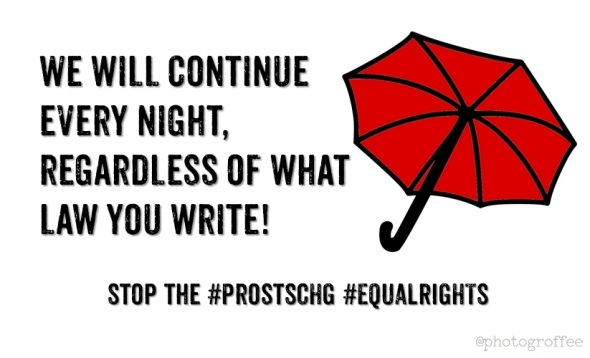
Slogan of Frankfurt protest in June 2015, organised by Doña Carmen
V4S conducted a survey among sex workers in Germany
To coincide with the International Day to End Violence Against Sex Workers, held annually on December 17th, Voice4Sexworkers* conducted a survey among sex workers in Germany, where the ruling coalition is working for two years already on a draft for a “Prostitutes Protection Law” (ProstSchG), said to protect sex workers from violence, coercion and exploitation. Manuela Schwesig, the Minister for Family Affairs, recently submitted a draft bill, which laid out plans how to control and regulate prostitution in Germany, although the actual goal of an EU directive was to create a law to fight human trafficking.
Since the prostitution debate in Germany is dominated by estimates and alleged facts – neither from reputable sources, nor based on verifiable evidence – Voice4Sexworkers wanted to find out what the current situation of sex workers in Germany actually looks like. More often than not, the media simply print two opposing opinions and then leave it at that. The actual mood among sex workers can hardly be derived from that. For many months, “experts” have been arguing over whether the law in its current form is necessary, but hardly anyone wonders about the opinions of those who will be directly affected by the law, or knows what needs they might have. It’s also quite difficult for outsiders to establish contact with sex workers, let alone gain their trust, especially if you don’t want to ask just one or two, but many sex workers about their opinions.
For that reason, Voice4Sexworkers started a survey among sex workers in December, which they could participate in anonymously until December 16th, 2015. Contrary to politicians, researchers or the media, Voice4Sexworkers was able to draw on a well-connected and large network, which demonstrably only sex workers have access to. Among other platforms, respondents were found on an online portal, where only sex workers can advertise their services. Voice4Sexworkers would like to thank all respondents for taking the time to participate in the survey.
Participation in the survey was completely anonymous and random. Therefore, respondents were able to respond freely and openly. As they survey wasn’t public and wasn’t publicly advertised either, the number of respondents was somewhat smaller, but in turn, this ensured that all participants were authentic and that no manipulation or falsification of data by non-sex workers was possible. Since not even Voice4Sexworkers knew the identity of the respondents, the responses offer an unfiltered insight into the world and lived realities of sex workers. Anyone questioning the credibility and correctness of this survey is welcome to contact Voice4Sexworkers and cite comparable surveys and specify their sources.
Contrary to existing and oft-cited studies, in which only members of certain groups were interviewed, e.g. drug users selling sex to finance their drug consumption or trafficked persons, this survey covers people across all work modes of sexual service provision. Their opinions and experiences are reflected in this survey, regardless if they are working on the street, at brothels, or as escorts. Intentionally, no group was excluded or treated or treated preferentially, because that would only have added to existing selective impressions from certain groups and not helped to show how the respective factors and circumstances affect sexual service providers in general.
Especially the responses to the question about what type of sex work they engaged in illustrate how respondents came from all areas and reflect the overall situation in Germany (percentage of the respective types of sexual service; distribution among the number of sex workers). Although the results confirmed their own experiences, even at Voice4Sexworkers, they were somewhat surprised how diversely a high number of sex workers operates and how wide-ranging the services are that they offer.
What didn’t surprise them was to learn that sex workers often don’t limit themselves to engage in a single type of sex work. Many switch back and forth between different types of services and offer services that are either the most profitable at a given time, or those that clients request, or those that are most practical for them due to private or other circumstances.
Other sex workers’ careers develop over time: some start by renting a room at a brothel but offer escort services or house calls later in life; others start out by working at apartment brothels but later switch to offer domina services because they developed a liking and the skills for it.
In that regard, Voice4Sexworkers’ survey offers facts that differ from the usual estimates. There isn’t the ONE typical sex worker, but just like in any other profession, people undergo a constant development and acquire skills while engaging in sex work. Or, as the survey also shows, some realise they aren’t suitable for the job or don’t like it, so that they want to change occupations as soon as possible.
However, the majority of respondents is engaged in sex work for the longer term and gathers experiences across different types of sex work, especially through contacts with their peers.
The other answers by the 69 respondents were not particularly surprising either, at least not for the members of Voice4Sexworkers, but merely confirmed what they and other sex workers have been saying all along.
With regards to the planned Prostitutes Protection Law, the following points are worth noting:
- Sex workers are insufficiently informed about the ProstSchG. Many of them don’t even know enough about the existing prostitution law.
- Only 4.3% favoured mandatory registrations, whereas 78.3% were against it.
- Over half of the respondents (53.6%) expressed that they were afraid of having to out themselves as a result of mandatory registrations…
- …which is probably why 44.9% have decided not to register with authorities and continue to work illegally, despite being threatened with fines.
- As a result of the law, half of the respondents worry about the future and are afraid to lose their job.
- Despite partially negative experiences with operators(65.4%), a majority is against statutory permission requirements for prostitution businesses (36.2%) and apartment brothels where two or more colleagues work together (68.1%).
- The prevalent belief that sex workers experience violence and abuse predominantly from clients could not be confirmed. It raises all the more starkly the question whether sex workers really need a law to protect them…
- …as the responses to the final question about their wishes illustrate. The gulf between sex workers’ actual needs and the planned regulations could hardly be any bigger.
But please read the entire result of the survey. The other figures and responses speak for themselves. (To pause the slide show, please hover over the image with your mouse and press the middle button.)
You can download the entire survey [in German] as excel file at Voice4Sexworkers. Alternatively, you can download the above graphics as pdf-file here.
Voices of sex workers
As part of the survey, respondents had the opportunity to leave an additional message. Some made use of that and left the following messages and opinions:
“The work with clients in itself is not the problem. Problematic are the conditions. Stigmatisation, the consequences of being outed/outing oneself, the helplessness when dealing with operators/lessors, and being afraid to call the police when you make negative experiences! They might then keep a record of you real name and, bam!, the stigma is engraved in your data.”
“It would be nice if people (the authorities) would simply ask first if one can work independently and wants to do it. The chaos surrounding registering a business and obtaining a tax code number should stop. There should be standardised regulations in all states.“
“I don’t have any problems with my clients but with the good citizens who outed me, ostracise me from society, and stigmatise me. With my CLIENTS I have no problems!”
“If this law will be adopted in its current form, it will create a parallel world again. Women who need the money will continue to work and then have to buy protection, which society is taking away from them through forced registrations and forced outing, from strong men… without the possibility to report exploitation, violence, coercion etc. to the police, because they would then have to admit that they illegally work in prostitution. Rights protect and empower us. If they are withheld, we are made into victims, especially of the rescue industry, which collects donations at our expense to finance itself and manifest its right to exist. This so-called help aims to deny our agency and right to self-determination, so that we’ll never be able to rid ourselves of the victim status they imposed on us and remain forever under their control.“
“Pity that the survey is only in German. That way, it will hardly be seen as scientifically credible…”
“I really wished there was more information, especially for colleagues who like to enter sex work, particularly foreign ones. Also more information for the public, so that our occupations gets out of the ‘dirty corner’ and more widely accepted.”
„I’m not afraid of a ban because in my opinion, that’s not compatible with Germany’s Basic Law. But even something like working ‘illegally’ will hardly apply to me as an escort, as long as it’s not forbidden to have private one-night stands. Whether or not money changes hands is only of interest for tax authorities – and if what I did was illegal, then the government can hardly levy taxes on it. It will also hardly be possible to prohibit having a private homepage or a blog with a contact form, where I offer dates – after all, I don’t have to publish a price list. But all that is of course a bad and burdensome game of hide-and-seek.
What I’m worried about is no the legal, but the societal persecution and discrimination. I don’t expect that a state of an employer protects me. I would never report sexual violence or rape anyway, even if I suffered them outside of sex work. Even experienced layers advise their daughters against it: the effort, the embarrassment of revealing it all in public, conviction and sentencing not being secure and often too low anyway. It’s not worth it. Besides, victims expose themselves to additional dangers, e.g. forced outing, public humiliation, blackmailing from officials, violence from the police. The only protection for me is an educated, emancipatory society.”
“It would be great if this survey would also exist in other languages! In Germany, many migrants are working in sex work, whose experiences would also be very important.”
“Since I do tantric work, I find it often difficult to see that as sex work. The working conditions for real tantric work are very different to those I learn about from sex workers. I see myself caught between the stools. Very uncomfortable. If only there wasn’t this headwind from politicians and society – because the job in itself is very satisfying, useful and fulfilling.”
“I like working in this job. It’s sophisticated and important.”
“Thank you for your work! Good that you are there. :)”
“I would like more protection for my job..!! And more understanding where to sleep, in the apartment where I work..!! How I can pay additional a hotel room and with a whore pass how can I be accepted at hotel???? Who helps me??”
“In the meantime, I’ve lost the belief that this government somehow wants to help us with the new law. On the contrary, they want to legitimise increased discrimination against us. These politicians want to demonise the voices of those women who live their sexuality independently and freely, and who refuse to let themselves be exploited for a pittance. These politicians want to see them yet again as demonised whores. We are not supposed to threaten the patriarchal, classist society. That’s why they don’t want to sit down together with us and make decisions over our heads.”

*Voice4Sexworkers (V4S) is a project by sex workers and for sex workers, and for anyone else interested in sex work and sex workers’ rights. V4S provides sex workers, friends, supporters and clients the opportunity to publish their opinions and comments. To learn more about V4S, please click here.
This survey was originally published as “Umfrage: Prostitution – Eine Momentaufnahme” by Voice4Sexworkers. Translation: Matthias Lehmann, Research Project Germany. Every effort has been made to translate this article verbatim. As a result, the wording may appear unusual on some occasions.
Swedish (Model) Logic
German original by Nadja Hermann. Translation by Matthias Lehmann. Posted with kind permission.
See also Prostitutes Protection Law Logic and Sex Work Logic.
“Politically motivated despotism” | Statement by sex worker counselling centre Doña Carmen in response to the derecognition of its charitable status
“Closed due to charitable status”
“Imagine if journalists asked us about our opinion about the planned ‘Prostitutes Protection Law’ and we had to say, “Sorry, we can’t talk about that, because our work must benefit the public.” – Franziska Funk, sex worker and member of Doña Carmen e.V.
Derecognition of Doña Carmen’s charitable status due to advocacy for the recognition of sex work as work
Please click here to read Doña Carmen’s statement in German.
Bitte klicken Sie hier, um die Erklärung Doña Carmens auf Deutsch zu lesen.
+++ Update +++ Following a petition by Constance journalist Dennis Riehle, the Hesse state parliament called on the state government to clarify why attac e.V. and Doña Carmen e.V. had their charitable statuses derecognised for engaging in political causes. The state government must now examine the legal situation. Riehle commented: “The petition was dealt with relatively quickly, which in my view indicates that the members of parliament share the concern that this matter, which can hardly be described as coincidental, requires clarification. The authorities will only be able to dispel the doubts if they produce valid arguments.” (Source: Dennis Riehle)
In September 2015, the Frankfurt tax office revoked the Gemeinnützigkeit (charitable status, lit. benefit to the public) of Doña Carmen, Association for the social and political rights of prostitutes, with immediate effect, and backdated its decision retroactively to 2011.
At first glance, the reasons appear contrived: “supporting women in prostitution in tax-related matters”; “offering guided tours through brothels” during the open night at Frankfurt’s station quarter (Bahnhofsviertelnacht). One can only shake one’s head.
But the core accusation levelled against Doña Carmen makes one’s ears prick up: the association is blamed for pursuing political goals, “continuously” and “in a non-neutral manner”, “by campaigning for political interests of prostitutes”. Explicitly, Doña Carmen is charged with engaging in “advocacy for the recognition of sex work as work”. Henceforth, the Frankfurt tax office no longer holds this as a charitable cause.
“Gemeinnützigkeit” as political weapon
The decision by the Frankfurt tax authority – should it become a legal precedent – is politically explosive since the “charitable status” (Gemeinnützigkeit) is used as a political weapon and the Charity Law (Gemeinnützigkeitsrecht) is being politicised in a reactionary manner. The goal here is to terminate a political consensus, in place for nearly 30 years, which recognises counselling centres for sex workers, which are normally set up as charitable organisations, as experts on the subject of sex work and as advocates for sex workers’ concerns.
Today, Doña Carmen is the target. And tomorrow?
The derecognition of the charitable status has serious repercussions for Doña Carmen with regards to the funding of the counselling centre’s work and causes major problems. Due to chronic underfunding, other counselling centres would experience the same problems. Today, Doña Carmen is being targeted. And tomorrow?
Other associations, e.g. Hydra e.V. in Berlin, Nitribitt e.V. in Bremen, Madonna e.V. in Bochum or Kassandra e.V. in Nuremberg, to name but a few, are all recognised as charitable, although structurally, their statutes are no different. On their websites, they also list political demands that are aimed at the recognition of sex work as work. Thus, if this is about the derecognition of the charitable status of counselling centres for sex workers, then the respective authorities should have no difficulties in proceeding, if they applied the standards of the Frankfurt tax office.
Blatant case of political despotism
The derecognition of Doña Carmen’s charitable status is a blatant case of political despotism and illustrates how these things develop:
Since 2001, Doña Carmen conducts guided tours through Frankfurt’s brothels. Since 2009, this also includes tours as part of the open night at Frankfurt’s station quarter (Bahnhofsviertelnacht). The tax office has been aware of all that for a long time, since the tours were listed in the activity reports presented for the recognition of the charitable status during previous years. Since Doña Carmen’s charitable status was recognised in the past despite the brothel tours, it indicates that it is not the practice of Doña Carmen that has changed but the views held by the Frankfurt tax authorities.
The same applies for engaging in advocacy for the recognition of sex work as work. Doña Carmen has uncompromisingly demanded this right ever since its establishment 18 years ago. Throughout all those years, the association’s charitable status has been reviewed repeatedly without any objections, on the basis of activity reports. Now, however, engaging in advocacy for the recognition of sex work as work has suddenly cost Doña Carmen its charitable status. This is, without a doubt, political despotism.
Timing is not coincidental
It is no coincidence that this derecognition of the charitable status happened at the very time when plans are made for a “Prostitutes Protection Law”, one of the most repressive legislative proposals against sex workers in German history. The federal government currently prepares to adopt a law, which would include the forced registration of sex workers, a measure last in place under the Nazis. In light of these circumstances, it’s nothing short of brazen to demand from counselling centres like Doña Carmen political “neutrality”. It’s probably not a coincidence either that those who have decisively campaigned for the rights of sex workers are targeted first.
Attack on sex workers’ rights
But mind you: the attack on counselling centres is actually one on sex workers. They are the target. Not only are their rights supposed to be eroded, but also their opportunity to access practical support. Therefore, the termination of the political consensus with regards to counselling centres will not be without effect for sex workers. In light of this reactionary development, the rights of sex workers have to be defended even more decisively and more specifically. Doña Carmen will continue to do so in the future. Authorities like the Frankfurt tax office will not bring us to our knees!
Request for donations
Doña Carmen is also in need of financial support and solidarity, however. We ask all those who value our work and commitment for donations, since our own resources won’t suffice to stem the costs for the pending litigation to regain the charitable status at the fiscal court.
Please note: Donations to Doña Carmen e.V. are currently not tax-deductible due to our officially certified advocacy “for political interests of prostitutes”, especially for the “recognition of sex work as work”. However, you can certainly receive written proof of your donation. For details on how to donate or contact us, please click here.
A PDF document containing a detailed analysis of the reasons given by the Frankfurt tax authorities for the derecognition of Doña Carmen’s charitable status can be downloaded on Doña Carmen’s website. This resource is in German.
Translation by Matthias Lehmann. Every effort has been made to translate this article verbatim. As a result, the wording may appear unusual on some occasions. Photo by Image Party (Creative Commons 0 License). Text superimposed.
Prostitutes Protection Law Logic
German original by Nadja Hermann. Translation by Matthias Lehmann. Posted with kind permission.
Ministers from 4 states demand comprehensive overhaul of “Prostitutes Protection Law”
 Ulle Schauws MdB (Member of the German Parliament), Green Party*
Ulle Schauws MdB (Member of the German Parliament), Green Party*
Wo Schutz drauf steht, muss Schutz drin sein*
*[lit. Where it says protection on the outside, protection must be included]
+++ Update: Click here to download the position paper as PDF. This resource is in German. +++
The Green Party believes that the “Prostitutes Protection Law”, submitted by Minister for Family Affairs Manuela Schwesig (Social Democrats), will be subject to approval by the Bundesrat, the upper house of the German parliament. The reason for that is that the Länder (states) are supposed to carry out mandatory health consultations for sex workers and will thus shoulder the financial burden of the law. “Federal laws containing duties for Länder to carry out such services require the approval by the Bundesrat”, writes Ulle Schauws, parliamentary spokeswoman for women’s affairs, in a position paper.
Schauws receives support from ministers Barbara Steffens, Irene Alt, Katharina Fegebank, and Anja Stahmann, who are responsible for prostitution-related matters Bremen, Hamburg, North Rhine-Westphalia and Rhineland-Palatinate. They criticise that the bill is expensive and bureaucratic, and required “states and municipalities to establish entirely new departments”. The predicted costs set out by the Ministry for Family Affairs were an underestimation. [Ulle Schauws and] the four ministers demand a comprehensive overhaul of the draft bill, also because it discriminated and stigmatised sex workers, e.g. through mandatory registrations.
Quotes from the Greens‘ position paper
 “What the BMFSFJ [Federal Ministry of Family Affairs, Senior Citizens, Women and Youth] presented after the tough negotations in the grand coalition, is a bill that continues the discrimination and stigmatisation of people engaging in prostitution and forces many of them into illegality.”
“What the BMFSFJ [Federal Ministry of Family Affairs, Senior Citizens, Women and Youth] presented after the tough negotations in the grand coalition, is a bill that continues the discrimination and stigmatisation of people engaging in prostitution and forces many of them into illegality.”
 “According to experts and [representatives of] prostitutes organisations, whom we have heard on this matter, most of this bill is headed into the wrong direction. The recent resolution by Amnesty International underscores yet again that the protection and human rights of prostitutes worldwide must be strengthened. The draft bill, however, considerably worsens the status quo for people engaged in prostitution. Instead of protecting them, it disproportionally puts pressure on prostitutes.”
“According to experts and [representatives of] prostitutes organisations, whom we have heard on this matter, most of this bill is headed into the wrong direction. The recent resolution by Amnesty International underscores yet again that the protection and human rights of prostitutes worldwide must be strengthened. The draft bill, however, considerably worsens the status quo for people engaged in prostitution. Instead of protecting them, it disproportionally puts pressure on prostitutes.”
 “Mandatory registrations are intended to particularly benefit victims of human trafficking. What the BMFSFJ ignores here are the experiences made in Austria. The mandatory registration ordinance for prostitutes, as currently used in Vienna, has shown that victims of human trafficking were in fact frequently registered but the authorities couldn’t recognise them. Would victims of human trafficking who are forced into prostitution but remain undetected despite (forced) registrations not believe their exploitation was legal? On the other hand, there are reasonable grounds to assume that a lot of prostitutes would not register and instead work illegally for fear of being forcibly outed, as has happened in Vienna.”
“Mandatory registrations are intended to particularly benefit victims of human trafficking. What the BMFSFJ ignores here are the experiences made in Austria. The mandatory registration ordinance for prostitutes, as currently used in Vienna, has shown that victims of human trafficking were in fact frequently registered but the authorities couldn’t recognise them. Would victims of human trafficking who are forced into prostitution but remain undetected despite (forced) registrations not believe their exploitation was legal? On the other hand, there are reasonable grounds to assume that a lot of prostitutes would not register and instead work illegally for fear of being forcibly outed, as has happened in Vienna.”
 “Within one and the same draft bill, the BMFSFJ conflates two separate regulatory areas, which should be dealt with in two laws: the regulation of occupations in prostitution and the criminal law dealing with human trafficking. The main problem with prosecution of human trafficking cases is victims’ fear to give testimony against their perpetrators. This willingness to give testimony would not at all be strengthened if the concerned persons must face the authorities in the course of registration procedures and are threatened with fines in case of non-compliance. Instead, we Greens demand a simpler procedure [for them] to attain the right of residence, to increase victims’ willingness to give testimony at the courts.”
“Within one and the same draft bill, the BMFSFJ conflates two separate regulatory areas, which should be dealt with in two laws: the regulation of occupations in prostitution and the criminal law dealing with human trafficking. The main problem with prosecution of human trafficking cases is victims’ fear to give testimony against their perpetrators. This willingness to give testimony would not at all be strengthened if the concerned persons must face the authorities in the course of registration procedures and are threatened with fines in case of non-compliance. Instead, we Greens demand a simpler procedure [for them] to attain the right of residence, to increase victims’ willingness to give testimony at the courts.”
 “All told, the draft is divorced from reality, inconsistent, and misses its actual goal. As a result of this so-called protection law, prostitutes would predominantly experience incapacitation and repression, instead of a strengthening and professionalisation of their occupation. We demand a law that takes the protection of people engaged in prostitution seriously and delivers what it promises. We call on the BMFSFJ to overhaul the draft bill with that in mind.“
“All told, the draft is divorced from reality, inconsistent, and misses its actual goal. As a result of this so-called protection law, prostitutes would predominantly experience incapacitation and repression, instead of a strengthening and professionalisation of their occupation. We demand a law that takes the protection of people engaged in prostitution seriously and delivers what it promises. We call on the BMFSFJ to overhaul the draft bill with that in mind.“
*Image: Website of Ulle Schauws (Creative Commons Attribution-NonCommercial-NoDerivs 3.0 Germany License). Source: Green Party. Translation: Matthias Lehmann. Click here to download the position paper as PDF. This resource is in German.
German sex worker organisation BesD responds to planned “Prostitutes Protection Law”
Press release by the Professional Association Erotic and Sexual Services (BesD)
Berlin, September 11, 2015: The Professional Association Erotic and Sexual Services (BesD) criticises the draft bill by the Ministry for Family Affairs for a “Prostitutes Protection Law” in the strongest terms. In its response, the BesD concludes, “A law that pretends to aim at strengthening the right to self-determination of a group of people but then denies them the maturity to make their own decisions, attempts to paternalistically ‘protect’ them from those decision, needlessly interferes with their basic rights, and that, quasi in passing, also creates regulations to save society from this group of people, allegedly in need of protection, via arbitrarily expandable ordinances, such a law is worse than no law at all. The ‘Prostitution Protection Law’ should be rejected in its entirety.”
Instead, the association calls for a complete decriminalisation of sex work, as recently also demanded by Amnesty International, the acceptance of sexual service provision as a freelance occupation, mandatory registrations for brothels in accordance with the Trade Law [GewO], and the expansion of voluntary counselling services.
You can download the complete response by the BesD on the organisation‘s website. This resource is in German. Translation of the above press release by Matthias Lehmann.
Decriminalising sex work is necessary but not enough
“The demand to decriminalise sex work is a necessary step but it doesn’t go far enough.”
By Theodora Becker*
With its decision to issue a recommendation to governments on how to safeguard sex workers’ human rights, Amnesty International has caused outrage, because it includes the demand to decriminalise sex work. What this means is to abolish laws and regulations that either directly subject sex workers to prosecutions, arrests and fines, or criminalise the organisation, support and intermediation of sex work. [According to Amnesty’s draft policy on sex work,] third parties participating in transactional sex should only be penalised, if they exert force and pressure on or violence against sex workers. Clients, too, should not be penalised simply for being clients.
“Germany is not the role model for decriminalisation”
Among opponents of prostitution, this suggestion has caused outrage. They are of the opinion that it would promote pimps, human traffickers and other exploiters of prostitutes and enable them to avoid prosecution, while the poor prostitutes would be exposed to them all the more helpless. People like to refer to the German situation to decry what decriminalisation would lead to. However, there are several things to note. Germany is not the role model for decriminalisation that Amnesty has in mind. Prostitution in Germany is largely, but not completely decriminalised. The main relic of the old criminalising and regulatory regime are off limit ordinances, which allow cities and municipalities to prohibit prostitution in certain areas “for the protection of youth and public decency”. They use them plenty, and in a discriminatory manner, too. A new off limit zone in the city of Dortmund was recently justified with the argument that street prostitution had become too attractive for [female] sex workers from Romania and Bulgaria, and that the city no longer wanted to provide such a magnet for Eastern European migrants.
It is necessary to distinguish between decriminalisation and legalisation. Decriminalisation signifies the abolition of criminal laws and ordinances that [exclusively] deal with sex work in a discriminatory manner. Legalisation would be the implementation of certain legal regulations of sex work. Sex worker organisations around the world demand decriminalisation as a necessary first step. Amnesty remained consciously noncommittal with regards to a concrete model of legalisation but established minimum standards that such a model should fulfil. Once again, Germany is hardly a role model in that regard. The plans for the new “Prostitutes Protection Law” [#ProstSchG] include mandatory registrations for prostitutes, which are not only problematic in terms of data protection, but in addition, they are discriminating against sex workers, for whom the measure has no benefits. In addition, the access to social security and labour rights, which Amnesty both calls for, is also not always guaranteed in Germany, especially not for migrants. And the fight against stigmatisation, which Amnesty demands from governments, is also not really fought with dedication in Germany.
“Decriminalisation must include third parties”
That the decriminalisation must include third parties to protect the human rights of sex workers is obvious: in France, for example, even lessors of apartments, where people engage in sex work, are liable to prosecution. If sex workers would report such a lessor, for example for an unacceptably high rent, they would effectively find themselves working on the street. Only in a decriminalised setting would they be able to insist on fair conditions.
Amnesty does not just talk about the decriminalisation of sex work but about various other measures governments should take to contribute towards providing people, who only choose sex work due to a lack of alternatives, with more opportunities. Those include socio-political and anti-discriminatory measures. Amnesty acknowledges that poverty, a lack of education, discrimination, and restrictive migration policies are jointly responsible for people working as sex workers who would prefer not to. It would be nice if opponents of prostitution would also come to this realisation: instead of constantly pushing the narratives of pimp networks and organised crime, they could say a thing or two about the economic conditions that push people into prostitution – just as they push people into other precarious labour conditions. The entirely undifferentiated reaction to Amnesty’s resolution once more unmasked the position of [prostitution] abolitionists.
*Theodora Becker is a PhD candidate at the Free University Berlin and an activist with Hydra e.V., a meeting and counselling centre for sex workers. The German original of this article was first published at leftist weekly Jungle World. Translation by Matthias Lehmann, Research Project Germany. As in the translation, Theodora Becker used the terms “prostitute” and “sex worker” interchangeably in her original text.
Photo (top): “Parapluies” by Kosta | Cropped from the original and used under Creative Commons 2.0 license. Image (bottom): @photogroffee
“Sex workers have the same rights as everyone else” – Press Release by Voice4Sexworkers
Amnesty International supports the human rights of sex workers and calls for the decriminalisation of sex work
Please click here to view the German original.
At the conclusion of its International Council Meeting in Dublin on August 11th, 2015, Amnesty International voted to henceforward support sex workers’ human rights and call for the decriminalisation of sex work.
Voice4Sexworkers, an NGO by and for sex workers, welcomes the long overdue decision by Amnesty International, as the global sex workers’ rights movement has demanded the very same since decades already.
In Germany, for instance, abolishing the pimping law [§181a of the German Criminal Code] was already suggested in 1973, since labour exploitation and taking advantage of the plight of third parties are already prohibited in accordance with the human trafficking law [§233 of the Criminal Code].*
People who work in the sex trade are not helped by destroying its logistics and infrastructure or through wholesale prosecution of operators of prostitution venues. In many countries, e.g. in France and Sweden, it is already considered as pimping when two women share an apartment to work from. They are then charged and penalised for mutual pimping. Instead of being able to support one another, they are thus forced to work alone and under increased risks.
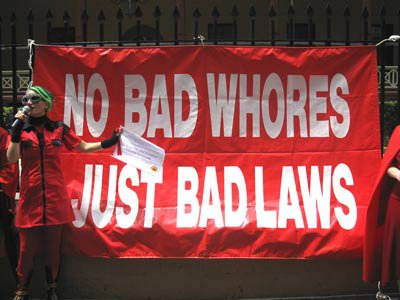
Decriminalisation does not mean to protect criminals or criminal networks. Those remain criminal under the existing criminal code that also applies to all other citizens. Rather, the objective is to abolish special laws that concern sex workers exclusively and make their work more dangerous. Other occupational groups are not controlled by the police in that fashion. In addition, special laws have a signal effect and lead to greater stigmatisation and discrimination against sex workers, which in turn affects their families and friends, too.
When criminal offences occur in the sex trade, the criminal code is sufficient to prosecute offenders, just as when they occur in any other trade. There is no need for special laws for the sex trade. The case numbers in the reports about human trafficking in Germany have consistently decreased, as evident in the reports by the Federal Crime Office [BKA].
Sex workers have the same right to free choice of employment as everyone else, and their choice must not result in being classified as criminals or in being subjected to controls at all hours without any suspicion of a crime being in progress.
*To avoid confusion: the call for the abolition of this paragraph is not tantamount to a call to legalise or decriminalise pimping but only to abolish special laws for sex workers, since exploitative labour practices in other occupations are all prosecuted under existing human trafficking law. Although the press release by Voice4Sexworkers amply explains this point, an additional clarification seemed necessary in light of countless misleading reports, incl. from well-respected media outlets, that Amnesty International‘s sex work policy was aiming to legalise pimping (see also below).
Original by Voice4Sexworkers. Translation by Matthias Lehmann. Published with kind permission.
“Let’s debunk the myths” – Video by Amnesty International
In an interview with Katie Nguyen of the Thomson Reuters Foundation, Amnesty policy adviser Catherine Murphy explained:
“We have to be careful with words like pimp because people often interpret that to mean an exploitative third party and we would not be calling for the decriminalisation of an exploitative third party. What (the new policy) would mean is the decriminalisation of laws on consensual sex work. Exploitation or trafficking within sex work would still be criminal offences. So the the low level operational aspects of sex work such as working together for safety, renting premises, organising together… these things would no longer be criminal.”
Amnesty‘s video below explains how protecting the human rights of sex workers does not mean protecting pimps. Alternatively, you can read Amnesty‘s Q&A on the Policy to Protect Human Rights of Sex Workers.
“Red Light Research” – Interview by Malte Kollenberg
Sex workers and allies protest in front of the South Korean Constitutional Court.
© 2015 Research Project Korea. All Rights Reserved.
Summary
In May, I accepted an interview request by Malte Kollenberg, a freelance journalist producing a series about Germans living in South Korea for KBS World Radio. After several negative experiences with the Korean media, it was refreshing to meet a sincere journalist willing to go the extra mile to communicate before, during and after our encounter to ensure that the subject of sex work would be dealt with appropriately.
Listen to the interview in German or read the translated transcript below.
Please note that the copyright for the interview recording lies with KBS World Radio and is not licenced under a Creative Commons License.
Interview
Introduction by Malte Kollenberg
Matthias Lehmann’s research deals with a stigmatised occupation. He currently works on his dissertation about sex work…
View original post 2,177 more words
Interview with Sonia, an Italian migrant sex worker in Germany
Before 1958, Italian law once stipulated that shutters of brothels had to
remain closed at all times, hence the name “case chiuse” or “closed houses”.
Clicca qui per la versione italiana di “Intervista a Sonia, sex worker in Germania”. Please note that the copyright for this article lies with Abbatto i Muri, where this interview was first published, and is not licensed under a Creative Commons License.
About this interview
Sonia is 33 years old and lives in Germany. She has been a sex worker for six years and she tells us – via Skype – what she thinks about the abolitionist trend that currently pushes Europe towards criminalising sex workers’ clients and further marginalising sex workers.
Sonia, first of all, how and why did you start sex work? Did you do it by choice or were you forced to do it?
I arrived here after trying to find work using my degree. I was unemployed, doing precarious jobs, like many others. Then I moved abroad and decided to work to be economically independent. I had different jobs but I could not quite make ends meet. I began to work as a prostitute by choice. For me, it’s a job like any other, and I can earn more money. I met a woman who did this and she gave me some tips. I was never forced to do anything.
Do you mind talking about your clients? Are they violent? How do you feel when you sell sexual services?
Violent? (laughs) Where I work the violent ones are kicked out on their asses. The good part of working without having to hide is precisely that. You can work at a place with better safeguards and you can count on others’ solidarity. How do I feel? Good. It’s my job. I often have fun. Sometimes I get bored, and only a few times I felt annoyed, and with those clients I haven’t worked anymore.
Are there also men or trans* people in your work environment?
Yes, of course. There is less demand for men, but trans* people are doing fine.
Do you plan on doing this job forever?
Forever? (laughs) Nothing is forever. I can stop working tomorrow or twenty years from now. It depends. Do you know if you are going to do what you are doing now for the rest of your life?
Actually, no.
Exactly.
Ok, let’s move on from these stupid questions, because I wanted to ask you about traumata and things like those but it looks like you have other things to talk about.
Oh, please. If you want me to play the part of a martyr, you have to pay me at least (laughs).
Why did you go to Germany to work as a sex worker?
Because it’s not possible in Italy. Until they regulate the profession, many Italians are going to move to Switzerland, Germany, or the Netherlands. It is too difficult in Italy. Escorts and those who work at apartments can manage to live well, but the law is aimed at making you rot on the streets, exploited by pimps.
Do you think regulation would improve your colleagues’ lives?
Of course. Think about the foreigners who will get a residency permit with a work contract. If they erased the criminal offence of abetting [prostitution], you are no longer going to rent an apartment in secret at very high costs. You could pay taxes. You could do everything in plain sight. You would no longer need a pimp to be ‘protected’ because if you work in a protected environment with your colleagues, violent clients cannot harm you.
“Vous plaît-elle?” (Do you like her?)
Painting by French painter Hermann Vogel
What do you think about the abolitionist wind from northern Europe that is influencing Italy too?
First, Italy had state-regulated brothels – the worst – and after that, the law has always been abolitionist. The Merlin Law* is abolitionist as well. In northern Europe, we have SWERFs [sex worker-exclusionary radical feminists] that are fighting a war. We are back in the puritan era. Sweden, which is a racist country with a lot of Nazi roots, is affecting other nations’ policies towards a morality that is misogynous, patriarchal, and sexophobe. In the Netherlands, they are talking about closing the windows. In Germany, they are discussing a law to register us and inspect us with a magnifying glass to see if we are infected. They’re not interested in our working conditions. What matters to them is protecting society from us whores.
In Italy, they say that regulation is useless because the German model, demanded by sex workers, has failed. Is that true?
Bullshit. In Germany, where regulation exists and where locals and prostitutes stick with it, it works. The fact is that most places in Germany did not apply the law because puritans have boycotted it. The philosophy of some authorities is one where they sleep better knowing there are whores on the streets in the hands of pimps, so that they can tell the tales of victims of exploitation, which is so useful to create statistics for organisations fighting human trafficking.
Are you saying that human trafficking or exploitation do not exist?
Not at all. I’m saying that in some places there certainly are exploitative conditions. Do all companies in Italy comply with the law? Isn’t there anyone taking bribes or failing to pay their contributions? Here it’s the same. Some do not pay taxes and do not follow the rules. Then there are women on the streets, and given that regulation has been boycotted in many places in Germany, they remain in the hands of pimps.
How do you think the problem of exploitation can be solved?
Through regulations. Enabling women to come out of the hiding. Even more so, if they come from abroad and are threatened by laws that want to push them back to their home countries unless they have jobs.
Are you aware that abolitionists deliberately conflate human trafficking with sex work? What do you think about that?
I think that’s terrible. What some of them write on Twitter or Facebook is repulsive. They are fanatics who are full of spite and don’t allow us to speak about what we do for a living. There are really few feminists like you who let us speak. Human trafficking is a problem we want to address. But that has nothing to do with those who, like me, chose this job. Anyone saying they are the same thing is telling lies.
Why do you think they’re doing that?
Don’t you think it’s obvious? Because they do not care about the fact that I want to be a prostitute and that I am not exploited by anyone. Prostitution is violence, they say, and all clients are rapists. They are so busy saving us that they have forgotten to ask what we think about that and what means we want to use to save ourselves.
What would you like to say to these women?
First, I’d say that I’m sorry they are ignoring what I think. I’m sorry that they are playing us off against one another, those prostitutes who do it by choice and those who are being exploited, as if I was denying their suffering. It’s a cruel and violent game, because I feel that any prostitute who is a victim of exploitation is like a sister of mine. I would like to talk with her, and not with those who exploit her to enforce an opinion that has nothing to do with us.
Have you ever known an exploited prostitute?
Of course. Do you think that if I saw one I would turn my back on her? I hosted many in my house, especially foreigners, who were persecuted by police due to the immigration laws. Instead of protecting them, they wanted to send them back like parcels in human skin with an expiry date on them. I have known many, I understand them, and many have told me that they need a contract to stay and to get rid of their pimps. If Germany or Sweden or other countries do not want to regulate [sex work], do you really think they worry about saving women? In my view, those who “worry” the most are the racist ones. Do you know how many women could get a residence permit if prostitution wasn’t criminalized? As a matter of fact, racists are the ones who push for abolitionism and Nazi-style registration of prostitutes. There’s not going to be a happy ending for those who don’t belong to the race they like.
As a matter of fact, in Italy, so-called trafficking victims sometimes end up at one of the Centres for Identification and Deportation (Centro di identificazione ed espulsione, CIE).
Sonia, what else would you like to tell me? Something that comes to your mind and you want the little world that reads this blog to know?
A hug to the sisters and colleagues who work in Italy and have to endure a lot of difficulties. Fight for me as well, and if you manage to achieve something, who knows, I might come back to Italy soon.
Footnote
* The Legge Merlin (Merlin Law, named after its main author, socialist MP Lina Merlin) became effective on September 20th, 1958. This law, still in force today with little change, revoked the previous regulatory system, prohibited brothels, and introduced “exploitation of prostitution” as a new criminal offence with the aim to punish pimping.
In Italy, “indoor sex work is prohibited though in practice, private apartments with only one sex worker are ‘tolerated’. The state seeks to prohibit or drastically re duce street prostitution. Soliciting is subject to a fine and is defined by law as ‘unabashedly inviting clients on the street’. It does not, however, prohibit loitering whilst awaiting clients on the street. The Domestic Security package of June 2008 invests mayors with the judicial power to declare anything that might endanger the security and decorum of the cities an emergency. For this reason, sex workers and their clients have been subject to special ordinances that allow municipal police to administer fines. In addition, the Public Security Law enables the local chief constable to impose and enforce a mandatory expulsion of persons from a city in which they do not officially reside. Currently, EU citizens who violate this ordinance are fined, while non-EU citizens, especially from African countries, are put in temporary detention/identification centres and, in accordance with the laws on immigration, are subsequently deported. … Migrants who hold a regular work or residence permit may engage in sex work. However, it is not a rare occurrence that the police revoke residence permits and begin deportation procedures for persons working in sex work.”
Source: TAMPEP International Foundation (European Network for HIV/STI Prevention and Health Promotion among Migrant Sex Workers), Main coordinator: Licia Brussa “A report on the intersections of legislations and policies regarding sex work, migration and health in Europe” pp. 19,34
Translation by Michela Cicco. Edited by Michela, Giulia and Matthias Lehmann. I would like to thank Eretica Whitebread for her permission to re-blog this interview and Michela and Giulia for translating and co-editing the English version.
Distorting MIRROR: The media’s fear of the truth*
 *The name of German news magazine DER SPIEGEL literally means ‘mirror’.
*The name of German news magazine DER SPIEGEL literally means ‘mirror’.
Two sex workers discuss the article “Aus der Deckung” (Out of hiding) by journalist Ann-Katrin Müller in German news magazine DER SPIEGEL.
Please click here to view the German original.
Here we go again
Apparently, journalist Ann-Katrin Müller drew no lessons from the fiasco of the SPIEGEL cover story “Unprotected: How Legalizing Prostitution Has Failed” (SPIEGEL 22/2013) or maybe she’s just aware of the power of the magazine for which she writes. To this day, the 2013 report is cited internationally by politicians and anti-prostitution activists as purported evidence for the claim that the German prostitution law had led to an increase in human trafficking, although the available data from the Federal Crime Office prove otherwise.
The SPIEGEL’s slogan is “Not afraid of the truth” but it still seems to take a while longer until readers will actually be allowed to learn it. After Müller’s article was published, three counterstatements appeared in no time, among them one from the Trade Association for Erotic and Sexual Services (BesD), an organisation of current and former sex workers founded in October 2013.
 “Not afraid of the truth: One moment, please”
“Not afraid of the truth: One moment, please”
In the following interview, sex workers Melanie (from Voice4Sexworkers) and Fraences talk about the renewed misrepresentations by the SPIEGEL and the truths, which Ann-Katrin Müller is obviously afraid of.
Interview
Research Project Germany: What was your first reaction to the article?
Fraences: When I read the headline and someone’s comment, “Oh, that’s going to be fun”, I immediately thought, that’s not going to be fun at all, since it’s the SPIEGEL.
Melanie: I was speechless. At first, I didn’t take it all that serious because I didn’t know the entire article. But a little later, the first scanned copies arrived and I was just shocked. How can you lie like that and then sell the whole thing as “truth”? And how could anyone even agree to talk to the SPIEGEL again after everything that’s happened there in the past?
See “Does legal prostitution really increase human trafficking in Germany?”
Fraences: People may believe that SPIEGEL cover story is old news now but politicians continue to use it to campaign against sex work. Both Uhl* in the Bundestag and parliamentarians in Canada have used that story as evidence while at the same time ignoring counterevidence provided by sex workers and researchers.
*Hans-Peter Uhl is member of the Conservative CDU/CSU faction in the German parliament and supports tightening Germany’s prostitution law.
RPG: Welche Punkte im Artikel von Ann-Katrin Müller seht Ihr als problematisch an?
Fraences: It starts from the very first sentence: “Dubious organisations … together with brothel operators”, followed by the description of Fabienne.* Both are intended to discredit sex workers and our organisations.
*Fabienne Freymadl is a sex worker and one of two political spokeswomen of the BesD.
Müller had claimed that Freymadl was wearing a transparent top and a black bra. In her reaction, Freymadl wrote: “I was wearing jeans and a sweater. I admire your imagination for thinking I had worn a transparent top. But that’s how things are in your profession. If the protagonist is well-behaved and boring, you invent a few juicy details.”
Melanie: The article is full of lies. If you take look at the demands of the BesD, you can see that Müller’s remarks are wrong. And anyway, whores have fought for many years for far more than what Müller’s summary alludes to. Last year, on the occasion of the International Whores’ Day, Voice4Sexworkers published an article by Fraences where she describes in great detail the demands of the whores’ movement of old and how many of them have been met so far.
Müller had claimed, “all three organisations” were of the opinion “that Germany needed as little regulation as possible”, and had added: “It seems that prostitutes’ organisations care about more than just the needs of whores.”
Fraences: Saying that all organisations have the same opinion and call for less regulation is simply fabricated. But Müller’s summaries and omissions are generally problematic. If one were to believe her, the laws concerning human trafficking were only about victims who are abducted and forced to work at brothels. But they are about so much more than that, and Müller therefore reinforces society’s false perceptions. No other trade is singled out and regulated by criminal law to prosecute crimes. By doing so, it suggests to both the public and reporters that prostitution is a trade permeated with organised crime, although official police statistics show that crimes in the sex industry have drastically decreased.
See §232 and §233 of the Criminal Code (StGB). Further articles concerning prostitution: Art. 297 Criminal Code Introduction Act (EStGB), §180a, §181a, §184f and §184g StGB, §119 und §120 of the Administrative Offences Act (OWiG), as well as §55 Abs. 2 Nr. 3. of the Residence Act (AufenthG).
It also annoys me how Schwesig* is portrayed, who, according to Müller, has no plans to outlaw prostitution like in Sweden. But the Swedish Model, which incidentally doesn’t work there either, would be impossible to implement in Germany, which is why Schwesig and others set focus on prostitution obstruction policies and deterrence. Through the reduction of legal work places they make life considerably harder for sex workers. The monopolisation in the prostitution business, which is already in progress, happens at the expense of our rights, just as it does in any other trade.
*Manuela Schwesig ist deputy party leader of the Social Democrats (SPD) and Federal Minister of Family Affairs, Senior Citizens, Women and Youth.
RPG: What’s your opinion about the SPIEGEL’s claim that the UEGD* assisted the founding of the BesD and the claim by the UEGD that they provided moral support for sex workers?
Melanie: That’s the biggest nonsense I’ve ever heard. I still have that email from Rettig* in which he expressed his reservations with regards to supporting us, and he didn’t reply to any of my following emails. My initial question to him was about whether or not he was interested to get together to draw up quality and labour standards. He didn’t really appear to take us seriously. I’ve never met him and his statements aren’t particularly helpful either. After all, he’s also calling for statutory permission requirements for prostitution businesses, which is in stark contrast to our position.
*The UEGD is the German Employers’ Association of Erotic Companies, of which Holger Rettig is the chairman.
Fraences: Rettig’s proposal for a special act granting brothels permissions to operate is a copy of a proposal by a lawyer, developed on behalf of a brothel operator. It’s basically a copy of the Restaurant Code adapted for brothels. Rettig’s proposal is an exact copy. So much for his great inputs.
Rettig contributed nothing whatsoever to the founding of the BesD. He was simply present during the “1st Prostitution Days” in Frankfurt, when Johanna* and I called for a first coordination meeting form an association in order to organise opposition against a brothel permission law. Afterwards, I never heard from Rettig again, and the UEGD became rather quiet, too.
*Johanna Weber is a sex worker and one of two political spokeswomen of the BesD.
Melanie: Exactly, but to clarify that once and for all: Rettig had no part whatsoever in the founding of the BesD, and that wouldn’t have been possible anyway, since he has never worked as a sex worker. And last fall, he didn’t come to the Sexarbeitskongress (sex work convention) either, although he was invited and supposed to give a presentation.
 This is not an actual SPIEGEL cover. Image: Matthias Lehmann
This is not an actual SPIEGEL cover. Image: Matthias Lehmann
RPG: Speaking of the Sexarbeitskongress. Could you respond to the claim that Eva Högl* was called a “Nazi” there? And what exactly happened during Manuela Schwesig’s visit in Nuremberg?
*Eva Högl is a member of the German parliament for the Social Democrats (SPD) and deputy leader its parliamentary group.
Fraences: I’m afraid I was outside when the commotion began, but I know that a representative of Doña Carmen simply reminded Högl that the last time, Germany had a law to register sex workers was under the Nazis, which is true. Sex worker weren’t even registered with the Bockschein under the Venereal Diseases Act of 1953.*
*Bockschein was a colloquial term for a public health certificate, which sex workers had to produce until 2000. The name derives from the Bock, the gynaecological examination chair.
Melanie: At that moment, I was also a little shocked, but when that short dispute broke out between that man and Eva Högl, in which she furiously demanded for him to take back his accusation, there was actually great silence. Those who read Müller’s article, however, must think that a mob of sex workers from the BesD attacked Ms Högl, and that’s rubbish, because that man is neither a sex worker, nor is he a member of the BesD. Speaking of Eva Högl, I will never forget her remark back then that she wouldn’t need any history lessons and who would even care about those old stories.
RPG: I also read that Eva Högl said that day that “None of those is here today”, referring to those sex workers for whom the Prostitutes Protection Law was intended. What’s your reaction to that?
Fraences: Anger over such an ignorant and arrogant attitude. I really asked myself, is she that stupid or does she only pretend to be? And when the discussion circled around mandatory registration, she tried to explain to us as a lawyer that this was a normality for all citizens, and then she mentioned the obligatory social insurance and Pantel* threw in the obligation to register with residents’ registration offices and business registrations. I couldn’t believe they didn’t know the difference. And that sort of people is ruling our country! Unbelievable, really, but I’m actually not buying that they don’t really know the difference. On the contrary, I believe they concocted this as a “good argument” for those who aren’t familiar with the subject matter. Mandatory registration for sex workers means registering with the police! Whoever claims this to be a common civic duty is lying.
*Sylvia Pantel is a member of the German parliament for the Conservatives (CDU/CSU). She’s in favour of raising the minimum age for prostitution from 18 to 21 and introducing a statutory permission requirement for prostitution businesses as well as mandatory health checks for sex workers.
Melanie: Yeah, absolute fury. When Högl uttered that sentence, there was a massive outcry in the auditorium. They always turn things around as it pleases them. Sometimes we are prostitutes to appear as “victims” in statistics, other times we aren’t prostitutes, so that one can exclude us from the debate. Nobody in the auditorium called Högl a “Nazi”, and the spontaneous applause merely followed the statement of the representative of Doña Carmen that there had already been a law once, which forced sex workers to register, back in 1939. One should be allowed to state the truth, shouldn’t one? All in all I have to say that Högl’s statements and attitude at the Sexarbeitskongress were truly revealing.
RPG: And what happened at the protest in Nuremberg?
Melanie: The protest in Nuremberg was a very spontaneous one, organised in less than 24 hours. I consciously didn’t launch the appeal via the BesD but only talked to colleagues I knew personally. So, the whole even was organised by Voice4Sexworkers and not by anybody else. On the contrary, colleagues from the BesD actually sent me texts and emails that morning, telling me I should better cancel or tone down the protest.
In Nuremberg, we used big signs to point to the very law from 1939, and there are photos from that day. The word “Nazi” was neither on our signs, nor did we utter it verbally, and we absolutely did not compare Ms Schwesig to the Nazis. I think, if we had done so, the media would definitely have reported about it, because many of them were present.* Generally, I find these accusations of alleged Nazi comparisons disgusting. They are simply attempts to undermine our arguments and to divert from the actual issues.
*The SPIEGEL also reported about the protest and cited the slogans on the signs.
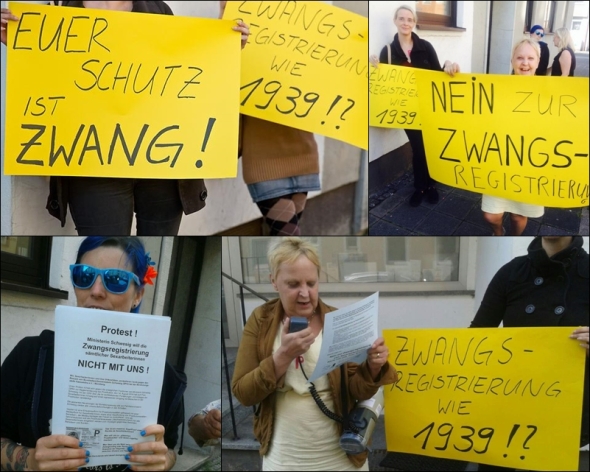 “Your protection is oppression” – “Forced registration as in 1939!?” – “No to forced registration”
“Your protection is oppression” – “Forced registration as in 1939!?” – “No to forced registration”
Sex workers protest in Nuremberg – Photos by Voice4Sexworkers
RPG: Müller writes that only a negligible number of sex workers is organised in trade associations and that one can hardly speak of a „lobby for all whores“. How do you respond to that claim?
Fraences: On the one hand, that’s true, unfortunately, but the BesD is still developing. In addition, the majority of sex workers simply wants to earn a living and be left alone. And from the very beginning, there was very little education about the law from the ministry. A booklet that Stefanie Klee* published is the only info material that the Federal Ministry for Family Affairs co-financed.
*Stephanie Klee is a sex worker and an activist fighting for sex workers’ rights since the 1970s. She’s a co-founder of the Federal Association for Sexual Services (BSD), not be confused with the BesD, where only current or former sex workers are organised.
The reason why migrant sex workers have only appeared sparingly with us up until now is what Klaus* also often points out, which is that there is very little education and integration of migrants. If they don’t fit into the “victim” pattern, they are excluded. The centre of most migrant sex workers’ lives is in their home countries, and they are often only here for several months or a few years in order to build a life back home with their savings.
*Klaus Fricke ist co-operator of Haus9 in Bremen, where sex workers can rent rooms to meet clients in, and a co-initiator of Project Ne-RO-In, which provides information for migrant sex workers.
Melanie: What also makes the work and recruitment so difficult for the BesD is quite simply the lack of funds for that, as well as for awareness-raising and outreach work. Most out there aren’t even aware of the current debate about a new law, let alone having heard of the trade association. They are still living in their little, “idyllic” world, unaware of the apocalypse that will soon befall the German Pay6 sector.
RPG: Speaking of Stefanie Klee. What commonalities and differences are there between the BesD and the BSD?
Fraences: Ever since its founding, the BSD is predominantly an association of operators. They are in favour of a special law granting brothels permissions to operate because they believe it will result in greater legal certainty.* I think that’s tricky because on the one hand, they are against the mandatory registration of sex workers, but on the other hand, statutory permission requirements would result in the obligation to register sex workers. Commonalities are for example our shared opposition of mandatory health checks, a law requiring condom usage, the prohibition of flatrate gangbang parties, special taxation, and special laws governing prostitution in the Criminal Code, in the Aliens Act, and in the respective police laws.
The bigger operators tend to favour a law requiring condom usage, even though some of them admit that they wouldn’t be able to control that anyway. Lobscheid from Pascha Cologne* doesn’t just call for a law requiring condom usage but also for mandatory health checks. He isn’t alone. Many operators are in favour of mandatory health checks, just as the clients.
*Armin Lobscheid ist the CEO of Europe’s biggest brothel, the Pascha in Cologne.
RPG: How do you generally rate media reports about sex work?
Melanie: I don’t usually like the term “Lügenpresse” (lying press) but where the SPIEGEL is concerned, the shoe fits sadly time and time again. Before I speak with the press, I rather use my own platforms, where our words aren’t twisted and the most important aspects aren’t omitted.
Fraences: When dealing with the press, one always needs to remember that they aren’t supporters of the fight for our rights and equal treatment with other occupations, but they simply want lurid stories, because articles about the everyday life of sex workers won’t increase their circulation. Most of the time, the media don’t really care about spreading information but only about shaping public opinion. The goal is to campaign for stricter controls and against prostitution.
RPG: Do you consider yourself as part of the “revolutionary basis”?*
*A phrase that appeared in the article
Melanie: Nah, that sounds condescending. We know very well what we are doing and we don’t need to justify ourselves to anyone.
RPG: Thank you very, very much that you took the time for this interview. I hope, you’ll meet some sincere journalists once in a while. They still exist.
ZerrSPIEGEL: Die Angst der Medien vor der Wahrheit
Zwei Sexarbeiterinnen im Gespräch über den Artikel „Aus der Deckung“ der SPIEGEL-Journalistin Ann-Katrin Müller
Two sex workers discuss an article by journalist Ann-Katrin Müller in German news magazine DER SPIEGEL. Please click here for the English version.
Alle Jahre wieder
Die Journalistin Ann-Katrin Müller scheint aus dem Fiasko der SPIEGEL-Titelgeschichte „Bordell Deutschland“ (SPIEGEL 22/2013) keine Lehren gezogen zu haben, oder vielleicht weiß sie schlicht um die Macht des Magazins, für das sie schreibt. Bis heute wird der damalige SPIEGEL-Bericht international sowohl von Politiker*innen als auch von Prostitutionsgegner*innen als vermeintlicher Beweis dafür angeführt, dass die deutsche Prostitutionsgesetzgebung zu einem Anstieg des Menschenhandels geführt habe, obwohl die verfügbaren Zahlen des Bundeskriminalamts das Gegenteil belegen.
Der SPIEGEL wirbt mit dem Slogan „Keine Angst vor der Wahrheit“, doch bis die Leser*innen diese erfahren dürfen, scheint es noch eine Weile zu dauern. Nach der Veröffentlichung des Artikels erschienen schnell drei Gegendarstellungen, darunter auch eine vom Berufsverband erotische und sexuelle Dienstleistungen (BesD), in dem aktive und ehemalige Sexarbeiter*innen organisiert sind.
Im folgenden Interview erläutern die Sexarbeiterinnen Melanie (vom Projekt Voice4Sexworkers) und Fraences ihre Reaktion auf die neuerlichen Falschdarstellungen des SPIEGELs und die Wahrheiten, vor denen Ann-Katrin Müller offenbar Angst hat.
Interview
Research Project Germany: Was war Eure erste Reaktion auf den Artikel?
Fraences: Als ich die Überschrift las, und den Kommentar von jemandem, „Oh das wird lustig.“, dachte ich mir gleich, das wird bestimmt nicht lustig mit dem SPIEGEL.
Melanie: Ich war erst einmal sprachlos. Zuerst hab ich es gar nicht so ernst genommen, weil ich auch noch nicht den kompletten Artikel kannte. Aber kurze Zeit später trudelten die ersten gescannten Exemplare ein und ich war nur noch geschockt. Wie kann man nur so lügen und das ganze noch als „Wahrheit“ verkaufen? Und wie kann man sich überhaupt noch auf ein Gespräch mit dem SPIEGEL einlassen, nach allem was da schon vorgefallen ist?
Siehe „Bordell Deutschland: Journalismus auf Lücke“
Fraences: Auch wenn man denken mag, die damalige SPIEGEL-Titelgeschichte ist lange her, so wird sie doch noch immer von Politikern benutzt, um Stimmung gegen Sexarbeit zu machen. Sowohl der Uhl* im Bundestag als auch Parlamentarier in Kanada haben die Story als Beweis angeführt, aber gegenteilige Aussagen von Sexarbeiterinnen und Wissenschaftlern ignorieren sie.
*Hans-Peter Uhl ist Mitglied der Bundestagsfraktion der CDU/CSU und setzt sich für ein verschärftes Prostitutionsgesetz ein.
RPG: Welche Punkte im Artikel von Ann-Katrin Müller seht Ihr als problematisch an?
Fraences: Das fängt schon im ersten Satz an: „Dubiose Verbände … gemeinsam mit Bordellbetreibern“, und dann folgt die Beschreibung von Fabienne.* Beides dient nur dazu, Sexarbeiterinnen und unsere Organisationen zu diffamieren.
*Fabienne Freymadl ist Sexarbeiterin und eine der beiden politischen Sprecherinnen des BesD.
Müller behauptete, Freymadl hätte ein durchsichtiges Oberteil und darunter einen schwarzen BH getragen. In ihrer Reaktion schrieb Freymadl: „Ich trug Jeans und Pullover. Ich bewundere Ihre Imagination, dass Sie sich vorgestellt haben, ich trüge ein durchsichtiges Oberteil. Aber so ist das ja mit meinem Beruf, wenn Protagonisten brav und langweilig daherkommen, dann erfindet man ein paar pikante Details.“
Melanie: Der Artikel ist voller Lügen. Wer einen Blick auf die Forderungen des BesD wirft, kann sehen, dass Müllers Ausführungen nicht stimmen. Und überhaupt kämpfen die Hurenverbände schon seit langem für weitaus mehr als das, auf was Müller es zusammengekürzt hat. Über die umfassenden Forderungen der Hurenbewegung von damals, und was bis heute von ihnen umgesetzt wurde, hat Voice4Sexworkers am Welthurentag im vergangenen Jahr einen Beitrag von Fraences veröffentlicht.
Müller behauptete, „alle drei Verbände“ seien der Meinung, „dass Deutschland so wenig Regulierung wie möglich brauche“, und fügte an: „Offenbar geht es den Prostituiertenverbänden nicht nur um die Belange der Huren.“
Fraences: Dass alle Verbände gleicher Meinung seien und für weniger Regulierung einträten, ist schlicht erfunden. Aber Müllers Zusammenfassungen und Auslassungen sind generell problematisch. Wenn man Müller glauben würde, ginge es beim Menschenhandelsparagraphen nur um verschleppte Opfer, die gezwungen werden, in Bordellen anschaffen zu gehen. Doch der Paragraph umfasst viel mehr als das, und Müller verstärkt so die falschen Vorstellungen in der Gesellschaft. Kein anderes Gewerbe wird gesondert im Strafrecht geregelt, um Straftaten zu verfolgen. So wird in der öffentlichen Wahrnehmung und Berichterstattung der Anschein erweckt, das Prostitutionsgewerbe sei ein Hort organisierter Kriminalität, obwohl offizielle polizeiliche Kriminalstatistiken zeigen, dass Verbrechen im Prostitutionsgewerbe drastisch gesunken ist.
Siehe §232 und §233 des Strafgesetzbuchs (StGB). Weitere Paragraphen die Prostitution betreffend: Art. 297 Einführungsgesetzes zum Strafgesetzbuch (EStGB), §180a, §181a, §184f und §184g StGB, §119 und §120 des Ordnungswidrigkeitengesetzes (OWiG), sowie §55 Abs. 2 Nr. 3. des Aufenthaltsgesetzes (AufenthG)
Mich nervt auch, wie die Schwesig* dargestellt wird, die, laut Müller, keineswegs die Prostitution wie in Schweden verbieten will. Das Schwedische Modell, das übrigens auch dort nicht funktioniert, wäre in Deutschland eh nicht umzusetzen, deshalb setzen Schwesig und andere auf eine Prostitutionsverhinderungspolitik und auf Abschreckung. Durch die Reduzierung der legalen Arbeitsplätze wird Sexarbeiterinnen das Leben erheblich erschwert, denn die sich bereits anbahnende Monopolisierung in der Branche geht, wie in anderen Berufen, zu Lasten unserer Rechte.
*Manuela Schwesig ist stellvertretende Parteivorsitzende der SPD und Bundesministerin für Familie, Senioren, Frauen und Jugend.
RPG: Wie steht Ihr zu der Behauptung des SPIEGELs, der Unternehmerverband UEGD sei an der Gründung des BesD beteiligt gewesen, und zu der Behauptung des UEGD, Sexarbeiterinnen bei der Gründung moralisch unterstützt zu haben?
Melanie: Das ist der größte Quatsch, den ich je gehört habe. Ich selbst habe noch eine Email vom Rettig* vorliegen, in der er Vorbehalte äußerte, eine Unterstützung anbetreffend. Auf weitere Emails reagierte er nicht. Da ging es um eine Anfrage von mir an ihn vor ca. zwei Jahren, ob er Interesse daran hätte, sich mit uns zusammenzusetzen, um Qualitäts- und Arbeitsstandards auszuarbeiten. Er hat uns mehr oder weniger nicht ernst genommen. Gesehen hab ich ihn noch nie und sonderlich hilfreich sind seine Aussagen auch nicht. Er tritt ja auch für die Erlaubnispflicht ein, was im krassen Gegensatz zu unserer Einstellung steht.
*Holger Rettig ist Vorstandsvorsitzender des Bordellbetreiberverbands UEGD.
Fraences: Rettigs Bordellgenehmigungsentwurf ist eine Kopie des Entwurfs eines Anwalts, der im Auftrag eines Betreibers entstand, und der vom Gaststättengesetz abgeschrieben und dann für Bordellbetriebe umgestaltet wurde. Den hat Rettig eins zu eins übernommen. So weit zu seinen tollen Inputs.
Der Rettig hat überhaupt nichts zur Gründung des BesD beigetragen. Er war bei den 1. Prostitutionstagen in Frankfurt schlicht anwesend, als Johanna* und ich zu einem ersten Kooordinierungstreffen aufriefen, um einen Verband zu gründen und Widerstand gegen die Konzessionierung zu organsieren. Danach hab ich niemals wieder was von Rettig gehört und um den UEGD wurde es still.
*Johanna Weber ist Sexarbeiterin und eine der beiden politischen Sprecherinnen des BesD.
Melanie: Ja genau, aber um das noch mal klarzustellen, der Rettig war definitiv nicht bei der Gründung dabei, und das wäre eh nicht möglich gewesen, da er nie aktiver Sexarbeiter war. Zum Sexarbeitskongress im Herbst letzten Jahres, zu dem er eingeladen war und wo er referieren sollte, ist er auch nicht erschienen.
Diese Abbildung ist kein echter Spiegel-Titel. (Graphik: Matthias Lehmann)
RPG: Stichwort Sexarbeitskongress. Könnt Ihr Stellung nehmen zu der Behauptung, Eva Högl* sei dort als „Nazi“ beschimpft worden? Und was genau ist bei Manuela Schwesigs Besuch in Nürnberg vorgefallen?
*Eva Högl ist stellvertretende Fraktionsvorsitzende der SPD-Bundestagsfraktion und Mitglied des Deutschen Bundestages.
Fraences: Ich war leider gerade draußen, als der Stress losging, aber ich weiß, dass ein Vertreter von Doña Carmen die Högl daran erinnert hat, dass es eine Registrierung von Sexarbeiterinnen in Deutschland zuletzt unter den Nazis gab, was richtig ist. Noch nicht einmal mit dem Bockschein unter dem Geschlechtskrankheitengesetz von 1953 hat man Prostituierte registriert.*
Als Bockschein wurde das amtsärztliche Gesundheitszeugnis bezeichnet, das Sexarbeiter*innen bis zum Jahr 2000 regelmäßig vorweisen mussten. Die Bezeichnung ergab sich aus dem Bock, dem gynäkologischen Untersuchungsstuhl.
Melanie: Ich war in dem Moment auch ein wenig geschockt, aber als sich das kurze Streitgespräch zwischen dem Herrn von Doña Carmen und Eva Högl entwickelte, in dem sie ihn wutentbrannt aufforderte, seine Vorwürfe zurückzunehmen, herrschte eher großes Schweigen. Wer Müllers Artikel liest, muss aber denken, ein Mob von Sexarbeiterinnen des BesD hätte Frau Högl angegriffen, und das ist Quatsch, denn der Mann ist weder Sexarbeiter noch Mitglied beim BesD. Vergessen werde ich in dem Zusammenhang nie Eva Högls Aussage, sie bräuchte keine Geschichtsbücher und wen denn heute die Geschichten von damals interessieren würden.
RPG: Ich las auch, dass Eva Högl damals sagte, in dem sie sich auf die Sexarbeiter*innen bezog, für die das Prostituiertenschutzgesetz gedacht sei, “Keine von denen sitzt heute hier.” Was ist Eure Reaktion darauf?
Fraences: Wut über so eine ignorante und arrogante Einstellung. Ich habe mich echt gefragt, ist die so doof oder tut sie nur so? Und als es um die Erklärung der Meldepflicht ging, da wollte sie uns als Juristin erklären, dass diese für alle Bürger gelte, wobei sie dann die Sozialversicherungspflicht nannte, und die Pantel* die Meldepflicht beim Einwohnermeldeamt oder die Gewerbeanmeldung. Ich konnte das nicht fassen, dass die den Unterschied nicht wissen. Und solche Leute regieren unser Land! Das kann echt nicht wahr sein. Allerdings nehme ich denen nicht ab, dass die den Unterschied wirklich nicht wissen. Ich glaube vielmehr, dass sie sich das als „gutes Argument“ zurechtgelegt haben für diejenigen, die sich mit der Materie nicht auskennen. Bei der Registrierungspflicht für Sexarbeiter geht es um eine Anmeldung bei der Polizei! Wer behauptet, dass entspräche einer allgemeinen Bürgerpflicht, lügt.
*Sylvia Pantel ist Mitglied des Bundestags für die CDU/CSU-Fraktion. Pantel spricht sich für eine Anhebung des Mindestalters für Prostitution von 18 auf 21 Jahren aus sowie für die Einführung einer ordnungsbehördlichen Erlaubnispflicht von Prostitutionsstätten und verpflichtende Gesundheitsuntersuchungen für Sexarbeiter*innen.
Melanie: Ja, absolute Wut. Als die Högl den Satz brachte, ging ein großer Aufschrei durch den Saal. Die drehen es immer so wie sie es gerade brauchen. Mal sind wir die Prostituierten, um für „Opferzahlen“ herhalten zu dürfen, dann sind wir wieder keine Prostituierten, damit man uns aus der Diskussion ausschließen kann. Niemand im Saal hat die Högl als „Nazi“ beschimpft, und der Beifall, den es an einer Stelle gab, galt lediglich dem Satz des Vertreters von Doña Carmen, dass es 1939 eben schon einmal eine Meldepflicht für Sexarbeiterinnen gab. Das wird man doch wohl noch sagen dürfen? Insgesamt lassen ihre Aussagen und ihr Verhalten beim Sexarbeitskongress tief blicken.
RPG: Und was passierte bei der Protestaktion in Nürnberg?
Melanie: Die Aktion in Nürnberg war sehr spontan und wurde innerhalb von nicht einmal 24 Stunden organisiert. Bewusst hatte ich dafür nicht innerhalb des BesD aufgerufen, sondern nur mir bekannte Kolleginnen angesprochen. Das Ganze war also eine Aktion von Voice4Sexworkers und nicht von irgendjemand anderem. Im Gegenteil: von Kolleginnen des BesD erhielt ich an dem Morgen noch SMS und Emails, ich solle die Aktion doch lieber absagen oder abschwächen.
Wir haben in Nürnberg mit großen Schildern genau auf genau dieses Gesetz von 1939 hingewiesen. Davon gibt es auch Fotos. Das Wort „Nazi“ war weder auf unseren Schildern, noch fiel es verbal, und erst recht nicht haben wir Frau Schwesig mit Nazis verglichen. Ich denke, wenn dem so gewesen wäre, hätten die Medien damals sicher darüber berichtet, denn die waren in großer Zahl vor Ort.* Generell finde ich diese Nazi-Vergleichs-Vorwürfe gegen uns ätzend. Damit wird nur versucht, unsere Argumente zu entkräften und vom eigentlichen Thema abzulenken.
*Auch der SPIEGEL berichtete über den Protest und zitierte die Slogans auf den Schildern.
 Sexarbeiterinnen protestieren in Nürnberg (Fotos: Voice4Sexworkers)
Sexarbeiterinnen protestieren in Nürnberg (Fotos: Voice4Sexworkers)
RPG: Müller schreibt, dass nur eine verschwindend geringe Anzahl von Sexarbeiter*innen in Verbänden organisiert sei und man „kaum von einer Interessenvertretung aller Huren“ sprechen könnte. Was ist Eure Reaktion zu dieser Behauptung?
Fraences: Auf der einen Seite stimmt das leider, aber der BesD ist ja auch im Aufbau. Hinzu kommt, dass der überwiegende Teil der Sexarbeiterinnen einfach in Ruhe ihr Geld verdienen will. Außerdem gab es vom Ministerium von jeher wenig Aufklärung über das Gesetz. Das einzige Infomaterial, das vom Bundesfamilienministerium mitfinanziert wurde, ist eine Broschüre, die Stefanie Klee* herausgebracht hat.
*Stephanie Klee ist Sexarbeiterin und Aktivistin, die sich seit Anfang der 1970er Jahre für die Rechte von Sexarbeiterinnen einsetzt. Sie ist Mitbegründerin des Bundesverbands Sexuelle Dienstleistungen (BSD), nicht zu verwechseln mit dem BesD, in dem ausschließlich aktive oder ehemalige Sexarbeiter*innen organisiert sind.
Dass migrantische Sexarbeiterinnen bei uns bisher nur wenig in Erscheinung getreten sind liegt auch daran, worauf Klaus* immer hinweist, dass es nämlich kaum Aufklärung und Einbindung von Migrantinnen gibt. Wenn sie nicht ins „Opferschema“ passen, werden sie ausgeschlossen. Die meisten migrantischen Sexarbeiterinnen haben ihren Lebensmittelpunkt in ihren Heimatländern und sind oft nur für einige Monate oder wenige Jahre hier, um sich mit ihren Ersparnissen später etwas daheim aufzubauen.
*Klaus Fricke ist Mitbetreiber des Haus9 in Bremen, in dem Sexarbeiter*innen Verrichtungszimmer mieten können, und Mitinitiator des Projekts Ne-RO-In, das Informationen für migrantische Sexarbeiter*innen anbietet.
Melanie: Was die Arbeit und die Mitgliederwerbung des BesD so schwer macht, ist schlicht und ergreifend auch, das die finanziellen Mittel sowohl dafür als auch für die Aufklärung und aufsuchende Arbeit fehlen. Die meisten da draußen haben noch gar nichts von der momentanen Diskussion über ein neues Gesetz mitbekommen, geschweige denn haben sie je vom Berufsverband gehört. Die leben immer noch in ihrer kleinen „heilen“ Welt und ahnen nicht, welche Apokalypse bald über die deutsche Pay6-Branche hereinbrechen wird.
RPG: Stichwort Stefanie Klee. Welche Gemeinsamkeiten und Unterschiede gibt es zwischen dem BesD und dem BSD?
Fraences: Der BSD ist schon seit seiner Gründung überwiegend ein Betreiberverband, der sich für die Konzessionierung ausspricht, weil sie sich dadurch mehr Rechtssicherheit versprechen.* Ich finde das schwierig, denn einerseits sprechen sie sich gegen die Meldepflicht von Sexarbeitern aus, aber eine Konzessionierung würde eine indirekte Meldepflicht nach sich ziehen. Gemeinsamkeiten sind beispielsweise vorhanden bei unserer Ablehnung von Zwangsuntersuchungen, einer Kondompflicht, einem Verbot von Flatrate-Gangbang-Parties, einer Sonderbesteuerung, und Sondergesetzen für die Prostitution im Strafrecht, Ausländerrecht und in den jeweiligen Polizeigesetzen.
*Siehe Gesetzesvorschläge des BSD
Die großen Betreiber sind eher für eine Kondompflicht, auch wenn sie teils zugeben, so etwas gar nicht kontrollieren zu können. Der Lobscheid vom Pascha Köln* hat sich nicht nur für eine Kondompflicht, sondern auch für Zwangsuntersuchungen ausgesprochen. Damit steht er nicht allein. Viele Betreiber sind für Zwangsuntersuchungen, genauso wie die Freier.
*Armin Lobscheid ist Geschäftsführer von Europas größtem Bordell, dem Pascha in Köln.
RPG: Wie würdet Ihr allgemein die Berichterstattung über Sexarbeit in den Medien beurteilen?
Melanie: Ich mag ja den Begriff „Lügenpresse“ nicht, aber beim SPIEGEL trifft er leider immer wieder zu. Bevor ich mit der Presse spreche, nutze ich lieber meine eigenen Medien, wo unsere Worte nicht verdreht werden und nicht die wichtigsten Aspekte weggelassen werden.
Fraences: Man muss gegenüber der Presse immer im Kopf behalten, dass sie keine Unterstützer sind im Kampf für unsere Rechte und eine Gleichstellung mit anderen Branchen, sondern dass sie einfach nur reißerische Themen haben wollen, weil Normalität in der Prostitution ihnen keine Auflagen bringt. Den Medien geht es meist nicht um Information, sondern um Meinungsbildung. Es soll Stimmung gemacht werden für mehr Kontrolle und gegen Prostitution.
RPG: Zählt Ihr Euch zur “revolutionären Basis”?
Melanie: Nö, das klingt abwertend. Wir wissen schon sehr genau, was wir tun, und müssen uns nicht vor irgendjemandem rechtfertigen.
RPG: Vielen, vielen Dank, dass Ihr Euch die Zeit für dieses Interview genommen habt. Ich hoffe, Ihr trefft auch manchmal auf ehrliche Journalist*innen. Es gibt sie noch.
Sex Workers’ Protest at International Women’s Day
Sex workers and allies protest against the planned ‘Prostitutes Protection Law’ at the International Women’s Day demo in Berlin. Photos published with kind permission by Susi Wilp (@hauptstadtdiva) and Friederike Strack. All Rights Reserved.

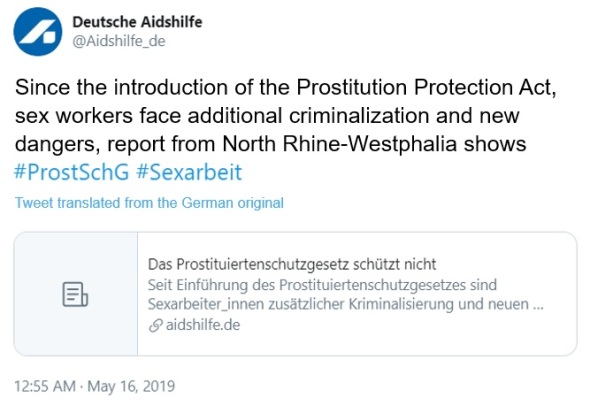


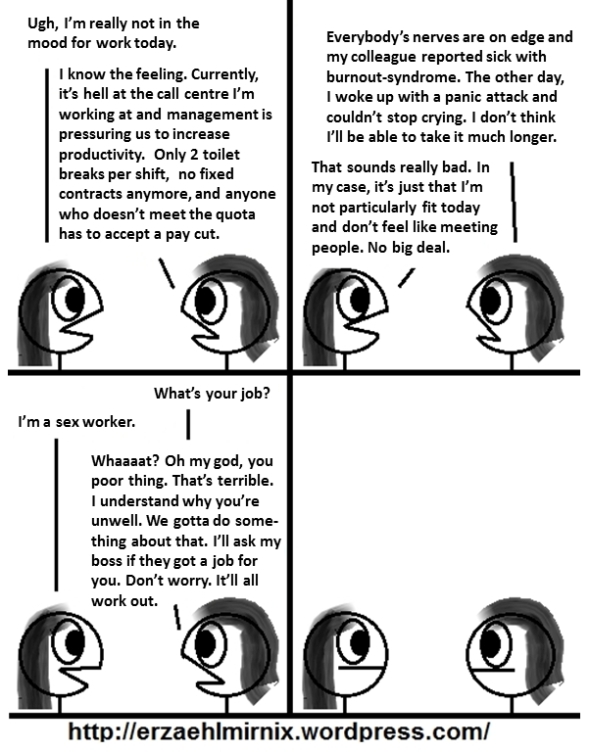
![Off-limit + tolerance zone Dortmund [cropped]](https://researchprojectgermany.wordpress.com/wp-content/uploads/2015/12/off-limit-tolerance-zone-dortmund-cropped.jpg?w=590)
